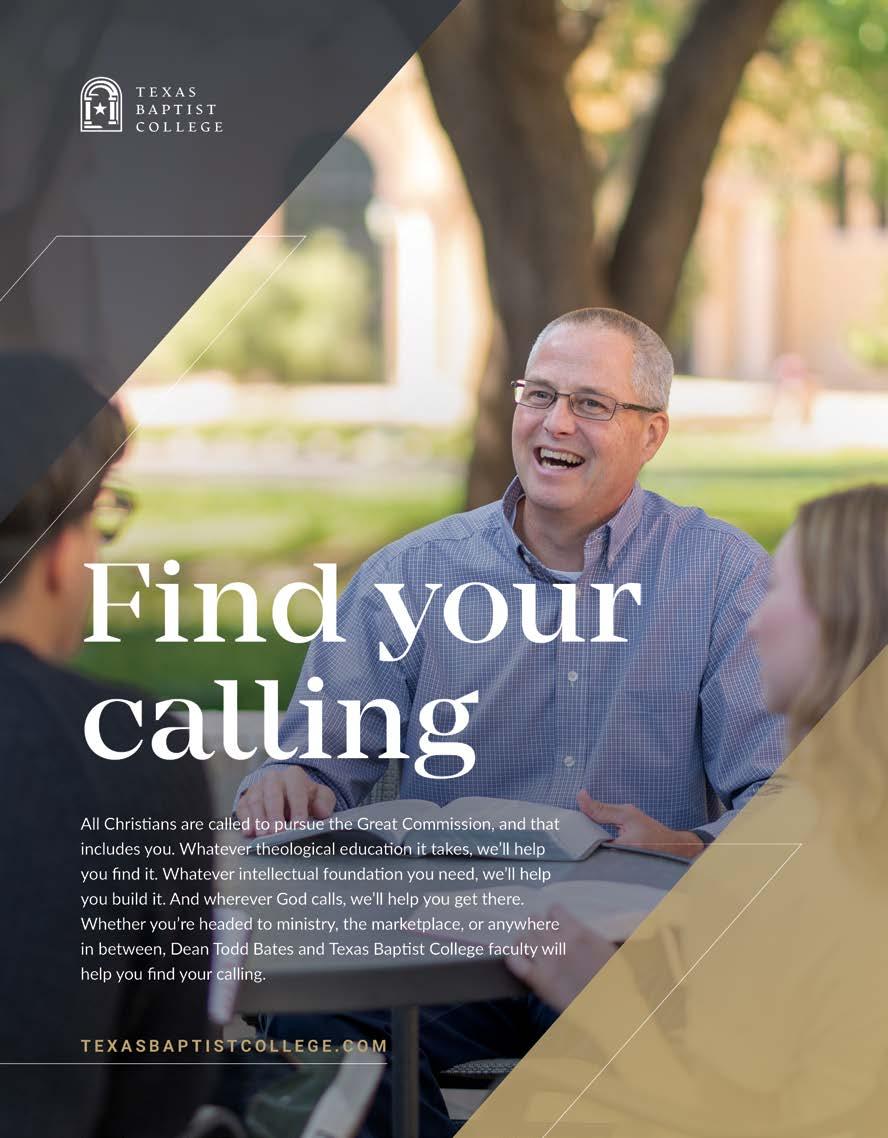The power of the Word of God in a lifetime of ministry
Charles Stanley’s obedience to the Lord yields fruit around the world.

The power of the Word of God in a lifetime of ministry
Charles Stanley’s obedience to the Lord yields fruit around the world.

The life and ministry of Southwesterners Charlie and Shannon Worthy.
journey of faith Alumnus Michelle Hicks helps women learn to be in God’s Word as they walk with the Lord.


O.S. Hawkins (’74, ’20) and Matt Queen share the power of a public gospel invitation.
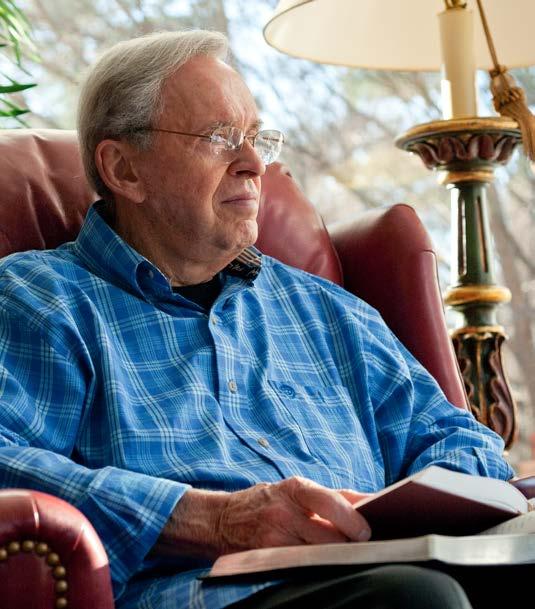
Alumnus Charlie Worthy (’00) and his wife, Shannon, mobilize young people to serve on the mission field in their roles with the International Mission Board.
Alumnus Michelle Hicks (’89) helps women learn to be in God’s Word as they walk with the Lord.

The role of biblical mentoring in the life and pastoral ministry of Jonathan Coleman (’12).
NEWS 08-20
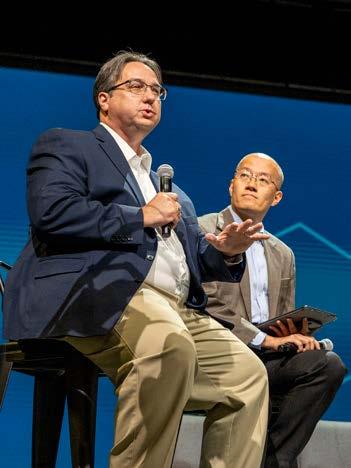
Dockery (’81) named interim president, Hawkins (’74, ’20) named senior advisor and ambassador-at-large, trustees approve McDow Chair, and more.
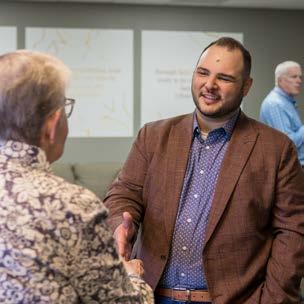
42 48
PEOPLE 21-23
Snapshots of the donors, alumni, students, and faculty members who make Seminary Hill a marquee place to study and live.
HOW-TO 25-27
SWBTS IN REVIEW 58-59
Books and resources out now from the SWBTS faculty, including the latest work published by Seminary Hill Press.
AROUND THE WORLD 60-61
News and updates from the classes of Southwesterners
The Southwestern story of retired Cmdr. Aaron Jefferson (’82, ’88) and his wife, Clainetta, of why they give to the seminary to advance the Kingdom.
WHY I GIVE 62-63
Fall 2022, Volume 80, Issue 02 swbts.edu/news
EDITOR-IN-CHIEF
David S. Dockery
EXECUTIVE EDITOR
James A. Smith Sr.
MANAGING EDITOR Ashley Allen
SENIOR EDITOR
Adam Covington
CREATIVE DIRECTOR
Emil Handke
WRITERS
Timothy McKeown Elizabeth Bennett
GRAPHIC DESIGNERS
Caitlyn Jameson, lead Savannah Cheatham
Bekah Jenkins
Chinsop Chong
Mark Ducommun
Jaclyn Parrish
Rebekah Hodges
1.800.SWBTS.01 swbts.edu
All content © 2022 The Southwestern Baptist Theological Seminary. All rights reserved.
To comment on articles in Southwestern News or to suggest story ideas, write to communications@swbts.edu
Southwestern News (ISSN 0038-4917) is published three times a year by the SWBTS Office of Communications 2001 W. Seminary Drive Fort Worth, TX 76115 817.921.8730
To subscribe, cancel or make mailing changes, please go to swbts.edu/magazine, call 817.921.8830, or write to the address below.
Issued three times per year.
Postmaster: Please send address changes to Office of Institutional Advancement P.O. Box 22500 Fort Worth, TX 76122
Stay Connected: swbts.edu @SWBTS SWBTS SOUTHWESTERNSEMINARY
Give to Southwestern Seminary: swbts.edu/give
generation who will serve as instruments of grace to bring renewal to the churches, and to extend the Gospel to the ends of the earth.
More than 300 years ago, Isaac Watts penned the words to one of his greatest hymns, “O God, our help in ages past, our hope for years to come.” We genuinely want to express once again, as has been the case on numerous occasions during the history of Southwestern Baptist Theological Seminary, that our only hope for the years to come is our eternal, triune God. Since 1908, Southwest erners, for more than eleven decades, have recognized the Lord God as our help and our hope. We ask you to join us in trusting the Lord for the future of this wonderful institution.
We are grateful to God for those who have led, for those who have taught, and for those who have served and shaped Southwestern through the years. For B. H. Carroll’s vision, for L. R. Scarborough’s leadership, for Roy Fish’s evangelistic zeal, for Floy Barnard’s commitment to students, for Curtis Vaughan’s commitment to the study of the Scriptures, for James Leo Garrett’s scholarship, and for Cal Guy’s heart for the nations, and for so many others who have invested much in the Southwestern community, we are truly and immensely thankful.
Those who currently serve at Southwest ern Seminary are committed to reclaiming and advancing the best of this distinctive Southwestern heritage. From the campus in Fort Worth, men and women have been pre pared to serve the Lord in every portion of the world. We long to see the Lord raise up a new
In this issue of Southwestern News, you will see markers of these commitments evi denced in the work of many, including Matt Queen, Amy Crider, Greg Wills, Joshua Wag gener, and numerous others. The accounts in this issue reflect echoes of Carroll’s vision, Scarborough’s leadership, Fish’s zeal, the warm-hearted teaching and scholarship of Vaughan and Garrett, Barnard’s love for stu dents, and Guy’s heart for the nations. Stu dents, who now come to Southwestern from every portion of the country and every region of the world, are privileged to learn from the current members of the gifted Southwestern faculty and staff.
These markers and commitments repre sent the priorities that remain at the forefront of what we seek to do all across the South western community, even during this time of transition. We find ourselves at this moment needing to discern and distinguish between those things that are imperative, those things that are important, and those things that are good. During this season, the seminary will work diligently to carry out those things which are imperative to advance the institutional mission, seeking to do so in a God-honoring way. The seminary will prioritize and evalu ate those things that are important, seeking to discern what initiatives and programs can and should be done at this time.
We all, also, need to recognize there will be a need to press pause on many good things, even things that add value to the seminary community. It has been stressed in recent days with the Board of Trustees, faculty, and staff that the Southwestern community needs to adjust its mindset to an essentialist approach regarding the use of institutional resources in the months ahead.
Southwestern is facing serious financial challenges that have been building in recent
months, but which also reflect multi-faceted matters covering a number of years. South western is not in a crisis, but these challenges could quickly escalate to a crisis if we do not aggressively move to address these chal lenges. Strategic efforts to address these challenges have already begun. We ask you to join us in praying that God, in His mercy, would once again grant His favor, grace, and bless ing to the Southwestern community.
I am genuinely grateful for the joyful privi lege to serve together with O. S. Hawkins and the members of the Board of Trustees, as well as the Southwestern faculty, staff, and stu dents. I am grateful for those who have faith fully coordinated prayer gatherings across the campus and in the churches. Already, hun dreds and hundreds of people from across the country and from around the globe have pledged their prayers for Southwestern in the months ahead. Might you also join us in reg ularly claiming and praying Psalm 90:17 for the Southwestern community? We also ask for you to prayerfully consider making a gift to Southwestern at this strategic time in the life of the seminary.
We are trusting the Lord to unite the South western family so that with one mind and one heart we can take steps forward to advance the Southwestern mission. For the churches, alumni, and friends who have stood with Southwestern through the years, we are most thankful. We ask you to join with us one more time as we work to “tell the generations fol lowing” of God’s faithfulness to Southwestern Baptist Theological Seminary.
And, with Isaac Watts, we pray that our loving and covenant keeping God, who is our help and our hope, will “still be our guard while troubles last, and our eternal home.”
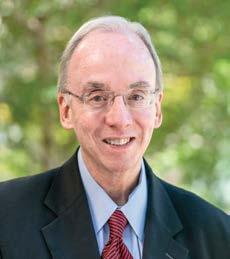
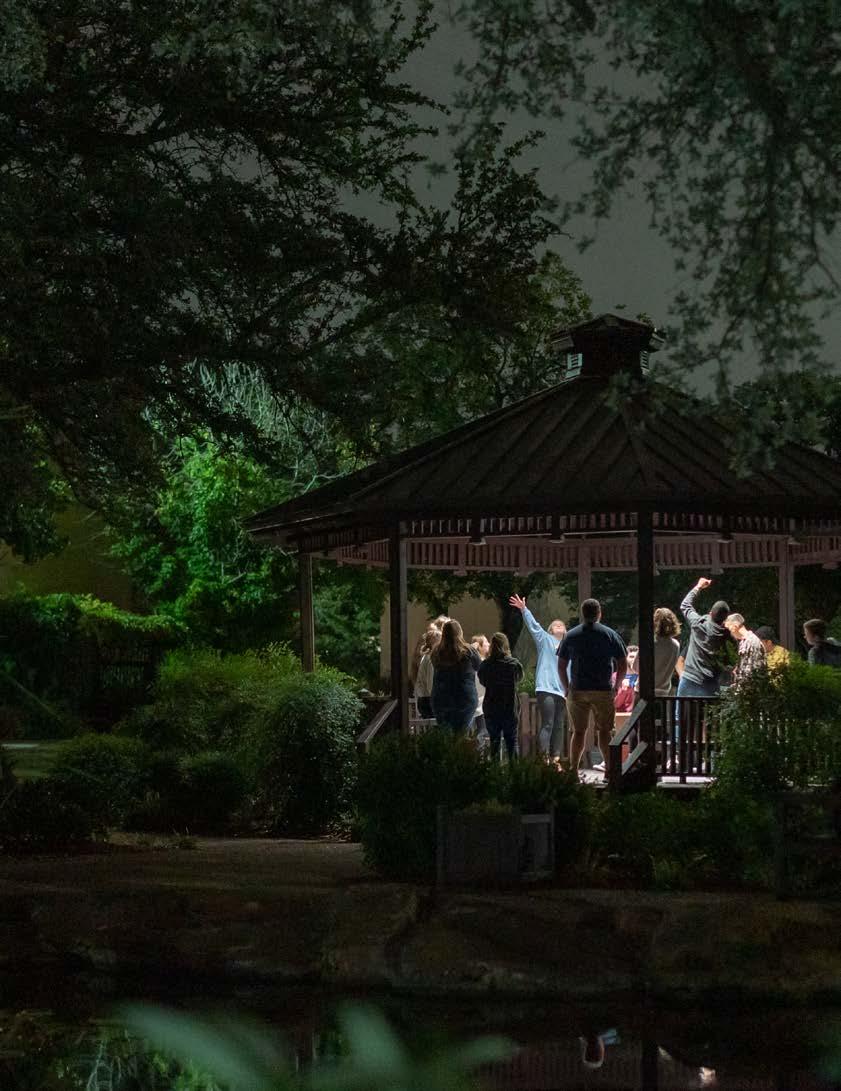
IN STUDENT-LED AND
GATHERINGS, Southwestern Seminary and Texas Baptist College students began meeting on Sunday nights for worship and prayer at the gazebo located on campus.

DURING ITS REGULARLY SCHEDULED MEETING ON SEPT. 22, THE EXECUTIVE COMMITTEE OF THE BOARD OF TRUSTEES of Southwestern Baptist Theological Seminary voted to extend an invitation to O.S. Haw kins (’74, ’20) to serve as acting president of the Fort Worth institution following the resignation of then-President Adam W. Greenway (’02).
At Hawkins’s request for a “more strategic option” to address the “combination of external and internal challenges facing the seminary” during the special called meeting of the Board of Trustees held Sept. 27 via video conference call, Chairman Danny Roberts (’79) announced the board voted to invite Hawkins and David S. Dockery (’81) to pro vide joint leadership to the seminary during the interim period. Dockery was announced as interim president, while Hawkins was named senior advisor and ambassador-at-large.
Hawkins said though he was “honored and humbled” by the invi tation of the Board of Trustees to serve as the interim president of Southwestern, he felt his “best efforts in piloting and positioning the seminary on its conservative course for the future are better served by giving attention to matters of general oversight, vision, and direction, and also shoring up our various and valuable outside constituencies.”
As interim president, Dockery oversees the daily aspects of lead ing the faculty, staff, and students. As senior advisor and ambassa dor-at-large, Hawkins provides general oversight of the institution.
Chairman Roberts said that he and the board of trustees “have complete confidence in both leaders,” noting that “their combined experiences in educational and denominational life will serve South western well in the days ahead.”
Hawkins said he and Dockery would “work together in tandem as important decisions present themselves in the future,” noting the joint interim leadership arrangement allows him to “use my best gifts to help guide the direction of the seminary and allow me to focus on donor relations, student recruitment, church and denominational rela tionships, and overall help to steer the seminary on a solid conserva tive course for the future.”
“It is no secret that the seminary has serious financial challenges and going forward we will be giving oversight to aggressively manage costs and implementing best business practices with the intent to move our school to a more solid financial footing,” Hawkins continued, noting he would “be visible on campus and will seek to provide vision ary and Christ-hearted, servant leadership to all the seminary family. Our deep desire and prayer is to be able to position this school we all dearly love to be in a better place for the tenth president in our long and illustrious history to succeed by every good and godly measurement. David and I both thank you for your prayers to that end.”
Dockery said that he was “honored by and thankful for this distinc
tive privilege” to serve his alma mater in this way. He noted that “it will be a joy to serve with O. S. Hawkins at this time as we join together with board members, campus leaders, faculty, staff, students, and friends of the seminary to envision a hopeful future for Southwestern, working collaboratively to advance the seminary’s gospel-centered mission for the glory of God.”
Soon after the interim leadership of David S. Dockery and O.S. Hawkins was named, Dockery called for 40 days of prayer for the seminary. Dockery and Hawkins joined a prayer gathering in the rotunda of the B.H. Carroll Memorial Building, Oct. 10.
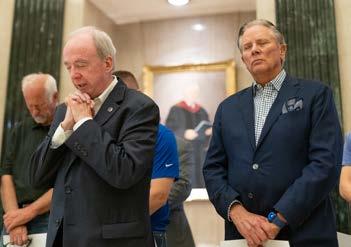
Dockery, who has served as distinguished professor of theology at Southwestern Seminary since 2019, is also the director of the Dockery Center for Global Evangelical Theology at Southwestern Seminary in addition to serving as the editor of the Southwestern Journal of The ology. He served as interim provost and vice president for academic administration at Southwestern from Dec. 2020 until February of this year. He brings almost four decades of experience in Christian higher education to the interim president role, including nearly half of that time as president at Union University. He has also previously served in various leadership roles at Southern Baptist Theological Seminary, Trinity Evangelical Divinity School, and with the International Alliance of Christian Education. Dockery is the author or editor of nearly 40 books and is a contributor to many more. He has held leadership roles in various organizations, including as president of the Evangelical Theological Society.
Hawkins served with distinction for 25 years as president of Guide stone Financial Resources until his retirement in March of this year. The Baptist statesman has also served as pastor of the First Baptist Church in Dallas, Texas, and the First Baptist Church of Fort Lauder dale, Florida. A gifted and much sought-after speaker, Hawkins is also the author of nearly 40 books.
Both Dockery and Hawkins are graduates of Southwestern and both are the recipients of distinguished alumni recognitions from the seminary.
In the days immediately following the announcement, Dockery met with faculty and staff and called the seminary community to 40 days of prayer for God’s mercy and favor, based on Psalm 90:17, which he named as the institution’s theme verse for the remainder of the aca demic year.
In response, beginning Oct. 3, Southwestern Seminary and Texas Baptist College faculty, staff, and students began gathering for prayer each Monday in the rotunda of the B.H. Carroll Memorial Building and have spent 30 minutes before the institution’s twice-a-week chapel ser vices in prayer in MacGorman Chapel.—Staff
SOUTHWESTERN BAPTIST THEOLOGICAL SEMINARY IS “NOT IN A CRISIS” but financial challenges “could quickly escalate to a crisis if we do not aggressively move to address them,” Interim President David S. Dockery (’81) told the seminary’s Board of Trustees Oct. 18 during its first regularly scheduled meeting since the resignation of former president Adam W. Greenway (’02).
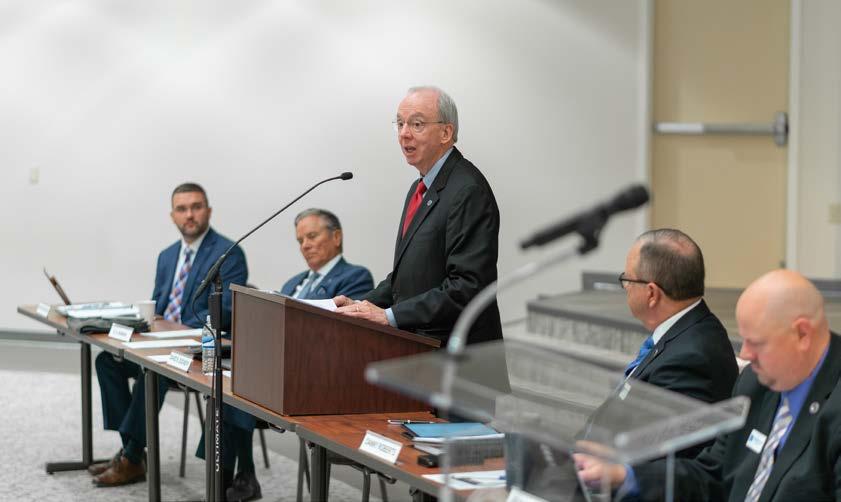
In addition to the full board meeting held on Oct. 18, trustees met in committee meetings and executive sessions of the full board on Oct. 17 for total of at least 12 hours over the course of the two-day meeting.
Pointing to the seminary’s history of innovation in theological education in its founding of first-ever evangelism, Christian edu cation, and church music programs, Dockery said the institution’s “pioneering strategies that shaped this seminary in last century must again become the guiding spirit as we look to the future with a spirit of innovation, creativity, and hopefulness.”
Joined by Chairman Danny Roberts (’79) and O.S. Hawkins (’74, ’20), senior advisor and ambassador-at-large, Dockery told trust ees of budget restructuring plans reducing the operational and per sonnel budget by at least 10 percent representing approximately $3.6 million, largely in the area of institutional support starting with programming before personnel. All three leaders spoke of new policies and procedures being implemented—what Roberts called “new financial guardrails.” Dockery noted some of the financial challenges facing the institution “reflect multi-faceted matters cov ering a number of years.”
Dockery also noted trustees have been evaluating for several years the “campus footprint and its optimal use.” While the 200acre campus is a blessing, it also “presents significant challenges. For this institution to have a sustainable business model, we must
reduce our campus footprint and the resource commitment it takes to maintain it.”
As part of that effort, Dockery said seminary officials have been preparing to sell the B.H. Carroll Park Apartments for several years due to “mounting maintenance and renovation costs.” The prop erty, which is “not contiguous with the main campus and is more than 50 years old,” has been listed for sale and several offers have been made. Current residents will be able to continue living at Car roll Park throughout the current academic year, at least, he said.
Trustees and administration will consider other pieces of land for possible sale, he said.
Roberts recounted for trustees the circumstances that led to Greenway’s resignation, speaking candidly about the Sept. 22 Executive Committee meeting and the “difficult decisions” made by trustees. Noting his role in Greenway’s election as ninth presi dent, Roberts said he is “convinced” God led the search committee and board to Greenway, who “accepted a very difficult assignment, which was further complicated” by the COVID-19 pandemic.
“Over time, unfortunately, several patterns developed that board officers and the Executive Committee had a duty to address,” he said. “As those became known, they were addressed in an appro priate manner. Significant financial challenges compounded a growing sense of concern among our board leadership.”
Among “areas of concern,” Roberts said, “were dysfunctionality amongst senior leadership, budget mismanagement, overspending resulting in hundreds of thousands of dollars of deficits per month, and attempts to pass the blame for these matters onto three differ ent chief financial officers who were each removed. More recently, it became clear that action was required after evidence emerged of escalating morale problem in the institution, especially among
Southwestern Seminary ‘not in a crisis,’ but financial challenges must be addressed, Dockery tells trustees
the faculty, and a resistance to safeguards board leadership wanted to implement.”
By the end of the Executive Committee meeting, Greenway “offered his resignation and the trustees accepted that resignation,” Roberts said.
Roberts praised the interim leadership of Dockery and Hawkins.
“In God’s good providence, He has provided to Southwestern an exceptional team as our interim leadership in Dr. David Dockery and in Dr. O.S. Hawkins—two leaders in Southern Baptist life who are univer sally respected and loved,” he said. “These Southern Baptist Conven tion statesmen with long track records of success as executives are Southwesterners who know this institution intimately and are invested very deeply in its history—and they are committed to our seminary’s future.”
He reported trustees would name a presidential search committee later.
Roberts also addressed the trustees’ role in reviewing seminary financial details.
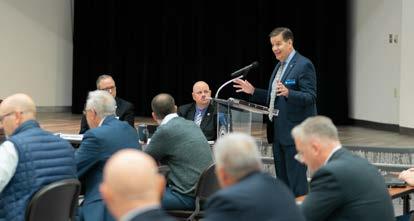
“In executive session, trustees had access to any and all informa tion they requested, including expenses and other expenditures that led us into serious financial concerns,” he said. “As a result, we are requesting the auditors to do some additional work to carefully exam ine all expenditures, especially those which raised concerns. We will govern Southwestern with the highest standards of financial account ability by implementing new processes and procedures to put new financial guardrails in place, and our new leadership is committed to manage spending aggressively.”
The chairman also said trustees “remain unwavering in our commit ment to our doctrinal standards as expressed in the Baptist Faith and Message, starting with a complete confidence in the inerrant Word of God as our only guide for our faith and practice.”
the most engaged group of men and women I have ever seen.”
Hawkins said that “every question you had has been asked, an openness that perhaps has never been seen before.” He commended the leadership of Roberts and said the board has worked with an “openness and seeking to be true stewards” of the institution. South western’s trustees are becoming “the standard for what every board of trustees ought to be and needs to do in SBC life.”
Hawkins reminded the board, “We’re stewards of a big vision,” reflecting on the history of the seminary.
“What a rich heritage and history that you hold in your hand, this stewardship of this ministry that has sent scores of thousands of men and women to the ends of the earth across the decades, sharing the old, oft-repeated story of Christ and His love, the Gospel, the message of Christ,” Hawkins said.
- HAWKINS (’74, ’20)
Hawkins said he sensed an obligation to take the role with the sem inary at the age of 75 and to do so as a volunteer because “I owe a debt to this place,” citing the “legacy” of those who have been trained at the school.
Hawkins, who earned both the Master of Divinity (1974) and Doctor of Philosophy (2020) from Southwestern Seminary, has been appointed by Dockery as senior professor of pastoral ministry.
John Rayburn, chairman of the Institutional Administration Com mittee, expressed confidence in the current interim administration, par ticularly noting the work of Michele G. Smith, interim vice president for financial services.
During the meeting, trustees approved various recommendations.
Trustees directed its Executive Committee to reevaluate the pro cedures of administration and board regarding hiring and firing senior officers, and authorized the administration to negotiate a line of credit for the institution in collaboration with the committee.
Roberts said the seminary is “not dependent on just one man,” noting the institution is “blessed with a faculty of scholar-ministers who love, serve, and equip students for Gospel ministry. The faculty is the curriculum, and our curriculum here at Southwestern is strong.”
Hawkins noted that he had a prepared statement that would be made available to the trustees and the press, but he wanted to offer a “personal word” about why he agreed to serve.
Noting the 25 years he worked alongside the Guidestone Financial Resources trustees as president, Hawkins thanked the trustees for their service. He said Southern Baptists should know “you have been
Trustees approved the Academic Administration Committee’s rec ommendation to consider a revised draft of the “One Southwestern: 2025” Academic Plan during the spring 2023 trustee meeting, at the request of the interim president.
Three curriculum recommendations were also approved by trust ees establishing the Graduate Certificate in Worship Leadership in the School of Church Music and Worship, the Undergraduate Certificate in Faith and Culture in Texas Baptist College, and a Doctor of Ministry Concentration in Biblical Theology in the School of Theology.
In other actions, trustees approved fall 2022 graduates nominated by faculty and certified by the registrar as having met the requirements for their degrees, amendments to the seminary’s bylaws, and a new and revised corporate resolution.
—Staff
“What a rich heritage and history that you hold in your hand, this stewardship of this ministry that has sent scores of thousands of men and women to the ends of the earth across the decades sharing the old, oft-repeated story of Christ and His love.”
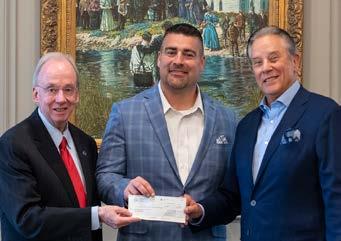
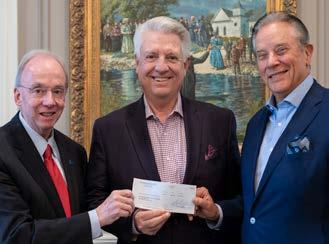
A COMBINED $450,000 IN GIFTS WERE GIVEN TO SOUTHWESTERN SEMINARY by the Southern Baptists of Texas Convention (SBTC), Pres tonwood Baptist Church in Plano, Texas, and Second Baptist Church of Houston, Texas in the days following the appointments of the joint interim leadership of O.S. Hawkins (’74, ’20) and David S. Dockery (’81).
In his Oct. 3 gift presentation of $250,000 to Southwestern Sem inary, SBTC Executive Director Nathan Lorick said it was the conven tion’s “honor and joy to partner” with the seminary in providing the gift to “help with the expenses, and to come alongside your faculty during this time of transition.” He also added, “The SBTC stands with you and we’re for you, and we love our partnership alongside you.”
Hawkins, senior advisor and ambassador-at-large at Southwestern, said, “On this day in 1910, the first classes were held here on Seminary Hill. This was made possible by the sacrificial gifts of Texas Baptist churches and members who adopted the vision of our founder, B.H. Carroll. It is fitting that on this memorable date Dr. Nathan Lorick and our friends at the SBTC present us a $250,000 gift to say, ‘We still believe in the future of our seminary.’”
Hawkins noted the gift in support of the faculty and other needs “will free up much-needed funds as another step in reestablishing our school on sound financial footing. May this be a seed that brings forth a multitude of churches and individuals to invest in what was, is, and will continue to be the gold standard for conservative theological edu cation with a heart for evangelism and missions.”
Dockery, interim president of Southwestern Seminary, said, “The entire Southwestern community joins me in expressing deep and heart felt gratitude to Nathan Lorick and the Southern Baptists of Texas for their generous investment in the Southwestern faculty at this key time in the life of the seminary. We look forward to enhancing the ongoing partnership with the Southern Baptists of Texas in the days to come.”
On Oct. 10, because of the “love and affection” he and his church
have for Southwestern Seminary, Jack Graham (’76, ’80), pastor of Prestonwood Baptist Church in Plano, gave a $100,000 gift from his church to the institution. Announcing on behalf of Ed Young, Graham said a matching gift would be given by Second Baptist Church in Hous ton, where Young serves as pastor.
“We are so encouraged by this latest sign of God’s provision for our seminary during this time of transition and financial challenge,” said Hawkins. “I want to thank my dear friend, Jack Graham, and his won derful congregation for this generous gift, as well as Ed Young and his congregation. We deeply appreciate gifts of all sizes from individ uals and churches and other friends in our Southern Baptist family. Together, these gifts will ensure a strong future for our seminary to provide conservative theological education for God-called men and women.”
In a statement, Young said, “I’m delighted that my congregation is able to join my friend Jack Graham and Prestonwood in giving this special gift to Southwestern Seminary. Although I’m not a graduate, Southwestern has been a blessing to our congregation, and I know how important Southwestern is to our state and beyond in providing doctrinally sound theological education. With David Dockery and O.S. Hawkins leading Southwestern, I’m hopeful about the future of the school. I invite other churches to join us in this worthy cause.”
Dockery also expressed his gratitude to Prestonwood and Second Baptist Church Houston.
“Southwestern Seminary is grateful for the confidence placed in our institution by these two great churches, the leadership of these pas tors, and for their generous support during this time of special need,” Dockery said. “We are working tirelessly to ensure that confidence is well placed. We also ask Southwesterners and other friends to join our faculty, students, and staff in prayer for the seminary with Psalm 90:17 as our theme for this year. We are hopeful about the future of Southwestern Seminary.”
Graham said Prestonwood wanted “to be a part of investing in the future of the seminary and to do something now that is just the beginning of what I believe is going to be an incredible recovery of stability and strength of our seminary going forward.” He encouraged other “pastors, regardless of the size of the church, to financially come alongside Southwestern during these days supporting our seminary with surplus funds with which they may be blessed as they near the year’s end.”—Staff
THE SOUTHWESTERN BAPTIST THEOLOGI CAL SEMINARY BOARD OF TRUSTEES UNAN IMOUSLY APPROVED the Malcolm R. and Melba L. McDow Chair of Evangelism during its Oct. 17-18 meeting. The new, fully endowed academic chair is in the Roy J. Fish School of Evangelism and Missions and honors the McDows for his role as professor of evange lism at Southwestern Seminary from 19822005. Carl J. Bradford (’11, ’18), assistant professor of evangelism in the Fish School, was named the inaugural occupant.
“We are deeply grateful to the generous friends of the seminary who made this aca demic chair possible,” said David S. Dockery (’81), interim president. “Malcolm McDow’s scholarship and passion for ministry has influenced innumerable students through his faithful service at Southwestern—an influence that continues to this day through the lives and ministries of his former students. It is fit ting that an academic chair for evangelism is named in honor of Dr. McDow and his wife.”
The chair is made possible by a gift from a donor who wishes to remain anonymous.
“An academic chair provides academic status to a school and to have a chair of this nature named in our honor is the highest recognition at a school,” McDow (’62) said. “Melba and I are deeply, deeply humbled and moved that this event is occurring.”
A native of Waco, Texas, McDow earned a Bachelor of Divinity from Southwestern Sem inary in 1962. He also earned a Bachelor of Arts in history at Baylor University in 1958, the same year he was ordained to ministry after the Lord called him to preach in 1954.
Melba McDow, a native of Corpus Christi, Texas, earned a Bachelor of Science at Baylor University in 1961 majoring in what is now known as family and consumer sciences. Following graduation, she moved to Houston, where her parents had relocated, and began
teaching kindergarten and high school sci ence. As a member of the college and career Sunday School department at First Baptist Church in Houston, Texas, she met McDow, who had started serving as the youth director at the church in 1962 following his graduation from Southwestern Seminary. The couple was married in December 1962 at the Houston church. McDow said his wife has been “very involved” in his ministry.
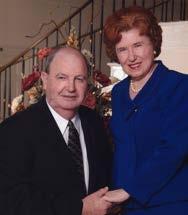
McDow earned a Doctor of Theology at New Orleans Baptist Theological Seminary in 1968 and began pastoring Cherry Road Bap tist Church in Memphis, Tennessee. While serving the west Tennessee church, McDow was also a fellow in the Department of Preaching and Doctor of Ministry supervisor for the Memphis area for NOBTS. Additionally, he was an adjunct professor at Union Univer sity in Jackson, Tennessee, before he served as the director of evangelism for the Tennes see Baptist Convention, 1977-1982.
McDow began serving at Southwestern Seminary as a professor of evangelism, even tually holding the L.R. Scarborough Chair of Evangelism (“Chair of Fire”) when he served as the chairman of the evangelism department in the early 1990s. McDow played a significant role in shaping Southwestern Seminary’s evangelism program and, alongside his col leagues, the late Roy J. Fish and James Eaves, helped establish Southwestern’s Doctor of Philosophy in evangelism. He was also instru mental in establishing the School of Evange lism and Missions, which was approved by the institution’s trustees in 2005.
He is also a 2019 Southwestern Seminary Distinguished Alumni recipient.
McDow is the co-editor of Revival and is the author of When the Fires of Heaven Fell, a comprehensive history of revivals that is scheduled for release in early 2023 by Semi nary Hill Press, the publishing arm of South
western Seminary.
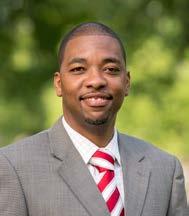
Bradford was named the inaugural occu pant of the McDow Chair by action of the board, effective Jan. 1, 2023. Bradford, who has taught at Southwestern Seminary since 2018, earned both Master of Divinity (2011) and Doctor of Philosophy (2018) degrees from the Fort Worth institution. The New Orle ans, Louisiana, native has led Southwestern Seminary’s Crossover team at the Southern Baptist Convention for the last two years in addition to leading Everyday Evangelism teams that allow students real-time opportu nities to share the Gospel in the Fort Worth area.
“Carl Bradford continues to carry on the longstanding commitment to evangelism that has characterized Southwestern Seminary since its founding, including B. H. Carroll, L. R. Scarborough, Roy Fish, and Malcolm McDow, among others,” said Dockery. “His commit ment to the Gospel and his love for people are evident to his students and to all with whom he comes in contact. We congratulate Carl Bradford on his appointment to the McDow Chair of Evangelism.”
Bradford said being named to the McDow Chair is met with three “emotions,” including “gratitude, honor, and responsibility.”
“Gratitude because the Lord has seen fit to have SWBTS support my evangelism efforts toward the present and future students,” Brad ford remarked. “Honor because I have the undeserving privilege to occupy a seat among a passionate group of professors and evange lists of SWBTS’s past and present, namely Dr. McDow, who consistently encourages me to be a scholar and practitioner of evangelism. And responsibility for leading the charge and stoking the flames of evangelism among and outside the SWBTS community.” —A. A.

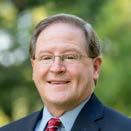
UNANIMOUSLY ELECTED Matthew McKellar (’85, ’91), professor of preaching in the School of Theol ogy, to the George W. Truett Chair of Ministry during its Oct. 18 fall meeting. The appoint ment is effective Jan. 1, 2023.
“Matthew McKellar is a gifted preacher as well as an exemplary teacher of preaching and pastoral ministry,” said David S. Dockery (’81), interim president of Southwestern Seminary. “He has commendably served Southwestern Seminary over the years, investing in students and faculty colleagues while serving churches with faithfulness. We congratulate him on this appointment to the prestigious Truett Chair of Ministry.”
Serving at Southwestern Seminary since 2010 and a long-time member at the First Baptist Church of Dallas where George W. Truett pastored the downtown Dallas church from 1897-1944, McKellar has over 30 years of pastoral ministry experience leading as senior pastor of churches across Texas. Addi tionally, he has served Southern Baptists in a variety of roles in denominational life.
“I am grateful to the Lord and to the lead ership of SWBTS for this appointment to the Truett Chair,” McKellar said. “Dr. Truett’s ongoing impact through his pastoral ministry, preaching, denominational leadership, and commitment to the vision for SWBTS artic ulated by B. H. Carroll is a distinct legacy in the landscape of Baptist life with which I am

MATT QUEEN, N. CHRIS SHIRLEY (’94, ’02), AND MICHELE G. SMITH were appointed to new roles as interim provost, dean of the Jack D. Terry School of Educational Ministries, and interim vice president for financial services and chief financial officer, respectively, Interim President David S. Dockery (’81) announced during the fall meeting of the Southwestern Baptist Theological Seminary Board of Trust ees, Oct. 17-18.
“Southwestern Seminary is blessed with many fine administrators who are able to take up new roles during this time of transition,” Dockery said. “I’m grateful for Matt Queen, Chris Shirley, and Michele Smith for their will ingness to accept key academic and adminis trative responsibilities at Southwestern. Each of these individuals is uniquely gifted to serve our faculty, students, and staff, and to provide leadership in vital areas of this institution.”
Interim Provost and Vice President for Aca demic Administration, Associate Dean of the Roy J. Fish School of Evangelism and Missions, Professor of Evangelism, and L.R. Scarborough Chair of Evangelism (“Chair of Fire”)
Queen joined the Southwestern Seminary faculty in 2010 after pastoring churches in his native North Carolina. He holds a Bachelor of Arts in religion from Mars Hill University near Asheville, North Carolina, and both the Master of Divinity and Doctor of Philosophy in applied theology with a focus in evangelism from Southeastern Baptist Theological Seminary in Wake Forest, North Carolina. Queen has authored several books in the area of evange lism, including Everyday Evangelism, Mobilize to Evangelize, and Recapturing Evangelism: A Biblical-Theological Approach, for which Dockery wrote the Foreword, and co-authored The Gospel Invitation with O.S. Hawkins (’74, ’20), senior advisor and ambassador-at-large at Southwestern Seminary.
Dean of the Jack D. Terry School of Educational Ministries, Professor of Foundations of Edu cation, Jack D. and Barbara Terry Chair of Reli gious Education
Shirley first served at Southwestern Sem inary from 2007-2016 as an associate pro fessor of foundations of education before serving at Dallas Baptist University as the
deeply honored to be associated.”

McKellar earned a Bachelor of Arts in religion and speech communications (1982) from Baylor University. He also holds Master of Divinity (1985) and Doctor of Philosophy (1991) degrees from Southwestern Semi nary. His doctoral dissertation focused on the preaching of the late W.A. Criswell, who pas tored First Baptist Dallas from 1944 until he transitioned to pastor emeritus in 1993.
McKellar has contributed chapters to sev eral publications including “Illustrating the Sermon” in A Pastor’s Guide to Text-Driven Preaching and “Preaching” in Ecclesiology of Church Revitalization. He has also contrib uted to volume one of Preaching for Church Revitalization and has contributed articles to the Southwestern Journal of Theology. He is a member of the Evangelical Theological Society and a member of the Evangelical Homiletics Society.
In addition to his teaching responsibili ties at Southwestern Seminary, McKellar has taught the Sonburst Sunday school class at First Baptist Dallas since 2013. —A. A.
program director for the Master of Arts in Discipleship degree program (2016-2019), returned to Southwestern Seminary in 2019 to begin serving as the associate dean of the Terry School and professor of foundations of education. He is a two-time graduate of the Terry School, having earned both Master of Arts in Religious Education and Doctor of Phi losophy degrees. Shirley also holds a Bache lor of Business Administration from Belmont University in Nashville, Tennessee.
Interim Vice President for Financial Services and Chief Financial Officer
Smith, who was named associate vice president for finance in March, was named interim vice president for financial services and chief financial officer. Smith, who served at Texas Christian University in Fort Worth for 14 years prior to serving at Southwest ern Seminary, holds a Bachelor of Business Administration and a Master of Business Administration, both with concentrations in finance, from Baylor University in Waco, Texas. She is a long-time member of Travis Avenue Baptist Church in Fort Worth, Texas. —A. A.
HEEDING THE CALL TO PRAYER FOR GOD’S MERCY AND FAVOR issued by Interim Presi dent David S. Dockery (’81), more than 100 Southwestern Baptist Theological Seminary and Texas Baptist College faculty, staff, and students gathered in the rotunda of the B.H. Carroll Memorial Building Oct. 3 for the first of many scheduled prayer gatherings for the sem inary and college community.
Malcolm Yarnell III (’91), research profes sor of theology at Southwestern Seminary and one of the conveners of the gathering, said, “We’re here to pray for God to bless the seminary, to bless all its constituencies, past, present, and future, [and] that God would take and fill these halls with many students again.”
Following his appointment as interim pres ident of Southwestern Seminary on Sept. 27, Dockery, who also serves as distinguished professor of theology and director of the
Dockery Center for Global Evangelical Theol ogy, encouraged prayer among the Fort Worth institution’s community. Specifically, he called on the seminary community to engage in 40 days of prayer and announced Psalm 90:17 would be the theme verse for the institution.
In response to Dockery’s appeal to prayer, Yarnell began planning a time of prayer for faculty and Chandler Snyder, associate vice president for student services, began plan ning a staff and student prayer time. The two marshaled their efforts so the entire seminary and college could pray together, although the first gathering fell during Fall Reading Days when classes do not meet.
Recalling the teaching of the late Distin guished Professor of Evangelism Roy J. Fish, Yarnell reminded attendees of the noted pro fessor’s “adamant” teaching that “we ask the Holy Spirit to come upon us to empower us, to
cleanse our hearts, [and] to lead us.”
Dockery thanked the crowd for gathering for prayer and their “commitment” to South western saying, “I am confident that the Lord will hear our prayers,” adding that the sem inary community must trust God to bless the institution.
Dockery also introduced Melana Hunt Monroe, daughter of the late T.W. Hunt, who served Southwestern Seminary as a professor of piano and organ. However, Hunt was seen as “the faculty member most committed to prayer” during Dockery’s time as a student, he recalled. Monroe, who leads a prayer effort across the state of Texas, has volunteered to “lead that effort to pray for Southwestern on a regular basis,” Dockery added.
Students, faculty, and staff joined in prayer as they praised God for His faithfulness and prayed as the Spirit led for several requests, among them for Dockery, O.S. Hawkins (’74, ’20), senior advisor and ambassador-at-large, the Lord’s work and hand on the campus, and a focus on the work of the Kingdom among other prayer items. —A.A.
THREE DAYS OF ACTIVITIES, ORIENTATIONS, INTRODUCTIONS, AND FUN AND GAMES filled the Southwestern Baptist Theological Sem inary and Texas Baptist College official kickoff of the new academic year with New Student Orientation, August 10-12, as new students pre pared for the new academic year on Seminary Hill.
“We did not know Southwestern was even a thing,” said Christian Betts, a new Master of Divinity student from Montana, who relocated to Dallas with his wife, Torri. The Betts learned about Southwestern Seminary from Torri’s uncle. “This was just outside of anything we even thought of or planned. Jordan Young in admissions did the campus tour and helped me sign up for classes. Just the time we spent here, we immediately felt that this is where we should be.”
“New Student Orientation is a pivotal experience in the life of a student,” said Chandler Snyder, associate vice president for student services. “Of course, for many Texas Baptist College students and families, it is a time of saying goodbye and trusting the Lord’s faith fulness for the future – both for their academic journey and their spir itual formation. For new Southwestern students, it is the first step to living the calling that God has placed on their lives. In either journey, New Student Orientation ushers in the next phase of personal and spiritual development.”
New students met with professors and fellow students, were assisted in moving in by members of the institution’s Student Life team, and enjoyed fellowship opportunities through meals, an ice cream social, and campus-wide recreational events and block party. —T. M.

W. MADISON GRACE II (’06, ’12), ASSOCIATE PROFESSOR OF THEOL OGY AND DIRECTOR OF THE OXFORD STUDY PROGRAM, AND JUSTIN WAINSCOTT, ASSISTANT PROFESSOR OF PASTORAL MINISTRY were named the Southwestern Baptist Theological Seminary directors of Research Doctoral Studies and Professional Doctoral Studies, respec tively.
“I am really excited to take on the role of director of Research Doc toral Studies at Southwestern,” Grace said. “These programs are highly dependent upon the individual work of Southwestern’s exceptional fac ulty, and I count it my privilege to step into this role to offer support to my colleagues. Our research doctoral programs are graduating stu dents who are adding to the literature in fields from worship to coun seling to missions and, of course, in biblical and theological studies, among others. I am looking forward to this new role and helping keep Southwestern’s research doctoral programs exceptionally strong.”
A Mississippi native, Grace began serving at Southwestern Semi nary in 2014 as an assistant professor of Baptist history and theology. In addition to his current faculty and administrative responsibilities, in his new role Grace will oversee all terminal degree programs, including the Doctor of Philosophy (Ph.D.) degree, which is offered in all four of the seminary’s graduate schools, the Doctor of Musical Arts (D.M.A.) degree in the School of Church Music and Worship, and the Doctor of Education (Ed.D.) degree in the Jack D. Terry School of Educational Ministries.
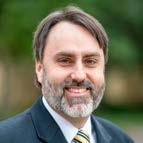
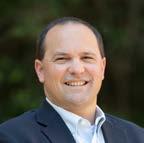
Grace earned both his Master of Divinity with biblical languages (2006) and Doctor of Philosophy in systematic theology (2012) degrees from Southwestern Seminary. He also holds a Bachelor of Arts in Christian studies degree from Mississippi College. Grace co-edited Making Disciples of All Nations: A History of Southern Baptist Missions in 2001 and has also contributed chapters to several works including, “Being Christ: Salvation and Bonhoeffer’s Christo-Ecclesiology” in Being Saved, “Baptists, Classical Ecclesiology, and the Christian Tradition,”
in Baptists and the Christian Tradition, and “Medieval Salvation,” in A Historical Theology for the Church
Wainscott, who was appointed assistant professor of Christian ministry and director of discipleship and campus ministries at Texas Baptist College in April 2021, began serving in the faculty of the School of Theology in June. In his administrative role overseeing the profes sional doctoral program, Wainscott will lead the Doctor of Ministry (D.Min.) and Doctor of Educational Ministries (D.Ed.Min.) degree pro grams that are offered in all four of the seminary’s graduate schools.
Calling it “an honor to serve” as the director, Wainscott said the reason “the PDS program is such an important part of the theological education Southwestern provides is ultimately because of the impor tance of the local church.” He said, “We believe that the churches we serve deserve the very best ministry leaders we can train. Therefore, we take seriously our role in helping shape pastors, missionaries, wor ship leaders, counselors, and others, into expert practitioners—for the glory of God and for the good of the church.”
A 2002 Bachelor of Arts graduate of Union University, Wainscott also earned a Master of Divinity from Beeson Divinity School (2005), and a Doctor of Ministry from Southern Baptist Theological Seminary in 2015. Prior to joining the faculty at Southwestern Seminary, Wainscott served as the senior pastor of First Baptist Church of Jackson, Tennes see, for over a decade. Additionally, he has served in other church staff roles in Tennessee and Kentucky. He has also served as an adjunct professor at Union University and a high school teacher at Trinity Chris tian Academy in Jackson, Tennessee. Wainscott is the author of Lost in Wonder, Love, and Praise: Hymns and Poems, and wrote the article on pastoral theology in A Theological Handbook for the People of God.
Grace and Wainscott’s appointments were effective with the fall 2022 academic semester. —A.A.
IN
IN NEED OF THEOLOGICAL EDUCATION , Southwestern Baptist Theo logical Seminary now offers full scholarships to all International Mission Board missionaries enrolled in master’s and doctoral programs, effec tive with the fall 2022 semester, the school announced on August 11.
Recognizing the Great Commission mandate to take the Gospel to the nations is the mission of the church, but financial barriers can prohibit missionary service overseas, Southwestern Seminary officials said the scholarships enable those who are called to give their lives in missionary service to receive theological education that will prepare
them to serve on the mission field.
Additionally, students who are current IMB applicants who have yet to receive appointments will have 100 percent of their tuition covered for a 36-hour Master of Theological Studies degree, which meets the mission board’s theological education requirements for missionary appointment.
Since its founding in 1908, Southwestern Seminary has trained more missionaries for service through the IMB than any other semi nary in Southern Baptist history, with alumni serving in every time zone around the world. —A.A.
THE SOUTHWESTERN
CHOIR FROM SOUTHWESTERN BAPTIST THEOLOGICAL SEMINARY sang in two concerts, breakout sessions, and with a mass choir of 250 people during the Sing! Conference held September 4-7 in Nashville.
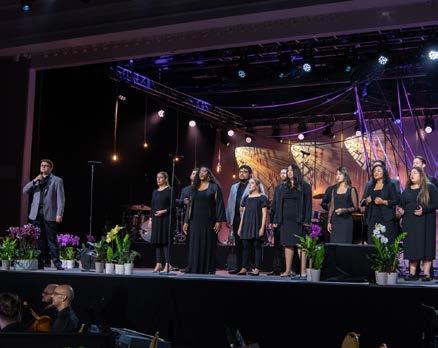
“I don’t know of another conference on the planet quite like the Getty Sing! Conference,” said Joseph R. Crider, dean of the School of Church Music and Worship at Southwestern Seminary. “Our students not only got to see world-class musicians offering their talents to the Lord, but they participated with those artists in the joyful work of Christian wor ship. On several occasions, our Southwestern A Cappella ensemble sang for conference attendees, and those people were encouraged not only by the musical artistry of our students, but by the authenticity of their witness through the songs they sang.”
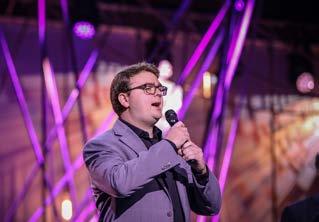
Southwestern A Cappella is made up of School of Church Music and Worship students enrolled at Southwestern Seminary and Texas Baptist College, the seminary’s undergraduate school.
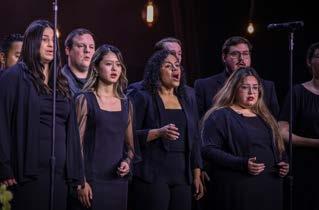
Kristen Patrick, a Texas Baptist College bachelor’s degree student with a concentration in vocal performance from Garland, Texas, said, “My favorite part was being able to worship with almost 7,000 other believers. Just to hear that many voices worshipping the Lord was almost unfathomable.”
Lina Cole (’21), a Master of Divinity in worship leadership from Cali, Colombia, said she was ministered to and encouraged greatly by par ticipating in the conference.
“We expected we were going to sing, but the most important thing that happened was how the event itself ministered to everyone in the choir,” Cole said. “It was an event that exalted the Word of God. It was very refreshing to be able to respond to the truth of God’s words with our affections. We found favor in the conference with the leader ship. People were thanking us for singing and saying they were being blessed.”
Matthew Waymack, a Master of Divinity in Worship Leadership stu dent from Flowery Branch, Georgia, said his favorite part of the con ference “was that the sessions reinforced what we as students are learning at school. It’s one thing to hear Dr. Lewis or Dr. Crider speak on a topic, but to hear that same topic being discussed in the Sing! Conference setting made it more contextualized to life outside of SWBTS.” He said his favorite song the Southwestern group sang from their “repertoire was ‘Only a Holy God’ because it asks the question, ‘who deserves our praise, our affection? Who else would send His only Son? Who else is worthy’ and it answers, ‘only a Holy God.’”
“God is truly showing SWBTS and the SCMW His favor,” Waymack observed. “I truly believe that God is using Dr. Crider and Dr. Lewis to faithfully lead our school and that they are remaining faithful to Him and His guiding. As a result, I feel like God is daily blessing us and opening doors as we continue to model Christ in our everyday living. The Getty’s Sing! Conference was direct evidence of that. Our deans led us in being faithful to go and to go for God’s glory and God has moved and is moving mightily. I personally am just overwhelmingly excited to see the fruit of our time and faithful labor this year at Sing.”
In addition to Southwestern A Cappella singing in various venues, the
t-shirts which were based on the cover art of Scripture-Guided Worship: A Call to Pastors and Worship Leaders, authored by Crider and which was released in 2021 by Seminary Hill Press, the seminary’s publishing arm. The t-shirt design was gold and was an artistic rendering of the ark of the covenant with Southwestern Baptist Theological Seminary and SCMW names embedded in the design.
During the conference, seminary leaders also introduced the new Graduate Certificate in Worship Leadership program. The degree will allow ministry leaders around the world who desire more training in corporate worship to study in an online cohort setting in a certificate program that is ten months long from start to finish. The program launches in January 2023. —E. B.
Photos courtesy of Getty Music.
IN HIS NEWLY CREATED ROLE AS ASSOCI ATE PROVOST FOR INNOVATIVE LEARNING , Michael S. Wilder said his daily mission is to ensure Southwestern Baptist Theological Sem inary and Texas Baptist College are “delivering premier online theological” education.
Wilder, who was appointed to the new role in June following nearly three years of service as the dean of the Jack D. Terry School of Edu cational Ministries at Southwestern Seminary, envisions five trends that will help guide his effort, including high engagement learning, student success, ministerial and vocational readiness, an increasing movement to online education while maintaining residential learn ing, and growing church partnerships includ ing internships and residencies.
In addition to providing oversight of all non-traditional academic programming, Wilder will lead collaboration efforts with fellow academic leaders in advancing educa tional excellence, faculty development, and strategic innovation, with specific areas of focus including online education, flex-access delivery, and ministry partnerships. Wilder remains in his faculty role as professor of educational ministries in the Terry School.
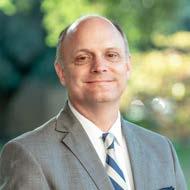
Wilder said the future of theological edu cation includes “thinking differently about online education” while also recognizing that “students want to be knowledgeable, compe tent, and ready.” He believes churches “want us to produce men and women…who are knowledgeable, competent, and ready with the assumed theological, biblical orientation foundation.”
The ultimate goal, Wilder explained, is to help students learn best and “help them become highly engaged learners” so they are “well-prepared ministers of the Gospel.”
“I’m grateful to be a part of an institution that is looking intentionally into the future of theological/Christian higher education in determining how do we best serve the church,” Wilder said. “We have academic leaders here who desire this institution to be the very best, and I think part of that means seeing the future and making the adjustments today.”
Southwestern Seminary and TBC “are committed to delivering premier online theo logical education for the global church by pri oritizing high-engagement learning, student formation, program success, and vocational readiness,” Wilder concluded. “As we seek to
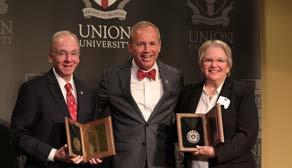
A “HUMBLED AND GRATEFUL” DAVID S. DOCKERY (’81), INTERIM PRESIDENT, DIS TINGUISHED PROFESSOR OF THEOLOGY and director of the Dockery Center for Global Evangelical Theology at Southwestern Baptist Theological Seminary, was inducted into Union University’s bicentennial hall of honor during Sept. 23-24 events held at the Jackson, Ten nessee, campus.
Dockery, who served as Union’s fifteenth president from 1995-2014, said “when one considers all of the significant people who have made lasting contributions to Union Uni versity over 200 years, it is extremely mean ingful to be included among that number.”
The bicentennial class of honorees was the first of its kind for the Tennessee-based university. Honorees were nominated earlier
this year and selected based upon criteria that included embodying the values and mis sion of the university; an affiliation with the university as an alumnus, former employee, or member of the Board of Trustees; honorable contributions to the university through dedica tion and achievement that have significantly affected the university; and providing support and mission advancement through leadership to alumni, students, or the Union community.
Dockery’s time as Union’s leader accounted for almost ten percent of the school’s history, during which time the univer sity saw several advancements.
“The Lord’s blessings rested upon our time at Union for nearly two decades,” Dockery said. “We were blessed to see enrollment increases, the development of a very strong
help every student live their calling, we believe that the faculty, program mentors, and minis try coaches have an indelible role to play in that educational process.” —A. A.
- WILDERfaculty, important connections with Baptist life, and the opportunity to rethink and rebuild major sections of the campus. It was reward ing to watch a team of people work together and pulled together in the same direction to work toward these ends.” —A.A.
“I’m grateful to be a part of an institution that is looking intentionally into the future of theological/ Christian higher education in determining how do we best serve the church”Union University President Samuel W. "Dub" Oliver named David S. Dockery and his wife, Lanese, to the Tennessee university's inaugural Hall of Honor. P hoto by Suzanne Rhodes, Union University.
WHETHER IN A SHORT-TERM OR LONG-TERM COMMITMENT, OR AS A SENDER, EVERY BELIEVER MUST “GIVE GOD YOUR GO” FOR MISSIONS , said Dean Sieberhagen, associate professor of Islamic studies at Southwestern Baptist Theological Seminary, following a July mission trip to Europe with seminary students and his wife, Sandra.

“I’m unapologetic. Every student has to give God their ‘go.’ Then a short-term trip is a way to see, ‘Okay, I got a taste of the field. Am I supposed to go?’” said Sieberhagen. “Or, ‘Now I’ve seen what it means to send some body and now, when I’m back in the U.S., as a pastor or whatever, I saw what the field is like, and why we give to Lottie Moon, and why we send people.’”
The team from Southwestern Seminary worked side-by-side with six Christians based in Europe during the summer mission trip, serving refugees from Afghanistan, Pakistan, Iran, Somalia, Syria, and Ethiopia.
Jerry Hatfield*, a Master of Divinity stu dent at Southwestern, and his wife Hannah*, a Master of Theological Studies student, moved from Austin to Fort Worth in 2020. This summer, they gave God their go, working with refugees, listening to their stories, and
sharing the love of Jesus. One story was from a 24-year-old man who walked along with another refugee for a long part of his journey, under cover of darkness, from Kabul, Afghan istan, to Europe, sleeping for only a few hours during the day.
The July mission trip was mostly to min ister to refugees from the Middle East who have never had a lot of material possessions. The refugees are dealing with tragic circum stances, and “have never experienced good. We’ve heard over and over again, ‘If God is so good, why was I born in Afghanistan? No matter where I go, people hate me because of the color of my skin, because of where I’m from,’” Hannah said. “They don’t know of the love of God.”
The work was mostly helping the refugees get ready for life in a new location, but primar ily, Jerry and Hannah simply listened to the stories from the refugees. Many of the refu gees know enough English, making it possible to learn their stories which consist of living constantly with the reality of war.
Jerry said there is a need for people to work with refugees. “They are overwhelmed. We’ve had a total of eight of us that are working this week. We’ve had over a hundred
people every day, men and women who are coming and we’re having conversations with them. Just hearing their stories provides an opportunity to share the Gospel. … But there’s so much more need for more workers.”
Sieberhagen affirms the value of students going to the field, joining academics with the practical experience of missions.
“We want to give students a taste of that. Jerry and Hannah here, they want to be mis sionaries, so them saying ‘Alright, let’s go on a trip together. Let’s see and let’s work with [those in the field], let’s see what they do and get a taste of what it takes.’ And let God use that to confirm either a place to go or just confirm when you take off,” Sieberhagen explained.—T. M.
*Names changed for security reasons.
TWO SOUTHWESTERN BAPTIST THEOLOGICAL SEMINARY STUDENTS HAVE FOUND THAT THE 2+3 MASTER OF DIVINITY PROGRAM was the quickest way to get to the mission field, gaining both practical experi ence and theological training in their education.
The married couple, Patrick and Libby Anderson*, went from enroll ing in Southwestern Seminary in the spring of 2019 to serving on the mission field in just over two years. But living life on fast forward fits Patrick, who is currently nine months into the three-year field portion of the 2+3 program.
The 2+2 and 2+3 programs in the Roy J. Fish School of Evange lism and Missions allow students to earn 60 course credit hours on the Southwestern campus, followed by either a two-year short-term missions commitment or a three-year long-term missions commit ment through the International Mission Board (IMB). The combination of course work and field experience counts toward a Master of Divinity degree with a concentration in international church planting.
Because Patrick and Libby are called to be career missionaries, he opted for the 2+3 program, which allows them to apprentice with a career IMB missionary and work with Central Asian refugees who are finding new homes in Europe.
Though there is a local church that has a fellowship for the people group they are serving, Patrick said having seminary-trained work ers on the field helps answer important questions such as “What is a pastor?” “What are the marks of a healthy church and how do you move towards that?” and “What even is a church?”
“All of these things are things that I have studied at seminary and that I absolutely need to know and use, because it is the biggest thing we are trying to answer,” Patrick said.
“Our people group is not the only group that needs theological training,” Libby said. “People who have been theologically trained are needed all over the world.” —T.M.
*Names changed for security reasons.
COMED MISSIONARIES FROM CENTRAL ASIA and featured missions from around the world for the fall Global Missions Week, held Sept. 12-16 for Southwestern Baptist Theological Seminary and Texas Baptist College.
International Mission Board missionaries spoke to more than 20 classes about work in Central Asia, hosted several question-and-an swer events, prayed for missions in Lottie’s Lobby in Mathena Hall, and even made time for flag football as well as a game of soccer with the students, faculty, and staff.
Southwestern hosts a week of global mis sions events twice a year and this week’s event was the fourth fall emphasis on Central Asia.
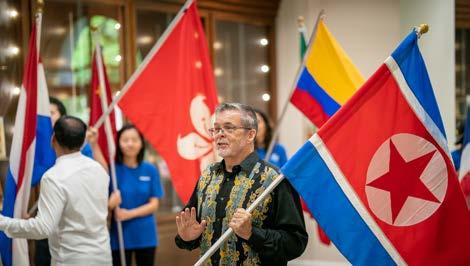
The week went “extraordinarily well,” said Ian Buntain, associate professor of missions and director of the WMC. A capacity number of students attended the Tuesday night fellow ship dinner, when missionaries gave testimo nies about their work that impacts 384 million people. “The World Mission Center has really benefited from amazing support from other departments, including the Riley Center, the School of Worship and Church Music, and our
NINE STUDENTS AND ONE FACULTY MEMBER FROM SOUTHWESTERN BAPTIST THEOLOGICAL SEMINARY AND TEXAS BAPTIST COLLEGE pro claimed Jesus on a mission trip to Southeast Asia, Oct. 1-11. The trip was a fruitful time which resulted in more than 50 professions of faith and many words of encouragement, participants said.
Despite “congested roads filled with trucks, motorcycles, pigs, goats, water buffalo and monkeys,” Ian Buntain, team leader of the group, said, “we are so grateful for God’s protection, both for us and for the many pastors that came” to the ministry opportunities that were offered. Buntain serves as director of the World Missions Center and associate professor of missions at Southwestern Baptist Theological Seminary.
The team conducted a variety of outreach efforts, including training
Student Services team,” Buntain said.
The response from the students was strong, Buntain said.
The missionaries also stated they were “impressed” with Southwestern’s Global Mis sions Week, with numerous activities planned including mission-focused chapel messages and music and flags of the nations lining the front of MacGorman Chapel for the two chapel services emphasizing missions.
Four evenings of food and fellowship and a Coke Break following Tuesday’s chapel all garnered interest and interaction from the students, which Buntain said was the goal of the week.
“The goal is unapologetically disruptive. Our desire is to intercept students while they are on their way to something else and remind them that everything else they may pursue in ministry—worship, fellowship, Bible knowl edge—will be known better in glory,” as a result of being missions-minded, Buntain said.
A Ph.D. in systematic theology student from Southeast Asia taking the class of Lilly Park, associate professor of biblical counsel ing, said he was encouraged and educated by the missionaries. “In this class, we were dis cussing counseling issues overseas. These believers who trust in Jesus bring baggage from their worldviews and cultures,” he said. He explained a cultural issue is that in some countries, lying is not so much a cultural wrong, especially when it protects a person’s honor or avoids shame. “Culturally, it doesn’t fit very well but you have to overcome that. But following Jesus is not supposed to be easy,” he added.—T.M.
national church planters, facilitating an animal clinic, three Gospel cru sades, children and youth ministry, evangelism, and Muslim outreach. “The team did a fabulous work here in Southeast Asia and led many people to Jesus,” said Sastry Meesala (’12, ’19), a 2019 Doctor of Phi losophy graduate of Southwestern Seminary, who leads a ministry in the region.
“We would enter the homes and share testimonies, Bible stories, and the Gospel message. We would do the same thing in the evenings but in the center of villages so people would be drawn by loud music and microphones. So many people showed up each time,” remembered Katherine Smith*, a Master of Divinity in evangelism and missions stu dent from North Carolina. They mainly ministered to children in orphan ages, to pastors’ wives and families in the villages. The team helped with Vacation Bible School for children, led worship for the evangelistic crusades, and traveled to different villages sharing their testimonies and Bible lessons. —E.B.
*Names changed for security reasons.
MORE THAN 50 PASTORS, STAFF MEMBERS, STUDENTS, AND BIBLE STUDY LEADERS gathered Oct. 3 for a preaching workshop at Southwestern Baptist Theological Seminary, gleaning insights from Paul’s letter to the Ephe sians.
Matthew F. McKellar (’85, ’91), professor of preaching in the School of Theology and chair of the seminary’s preaching department, mod erated the day-long, five-session workshop, saying its goal was to minister to, encourage, and serve primarily pastors, but also “anybody who is handling the word of God. What our goal is, in one day, to handle the book from start to finish,” McKellar said.
McKellar, who began the workshop with an overview of Ephesians and an exposition of chapter 1, was followed by Chris S. Osborne (’77, ’19), professor of preaching who pre viously pastored Central Baptist Church in Bryan, Texas; Daniel C. Dickard (’14, ’17),
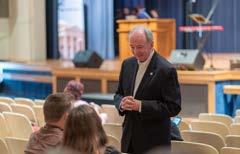
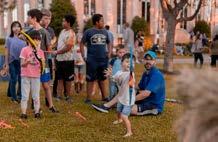
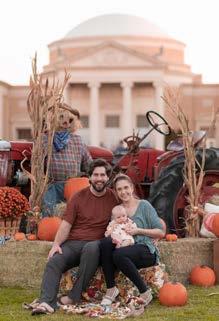
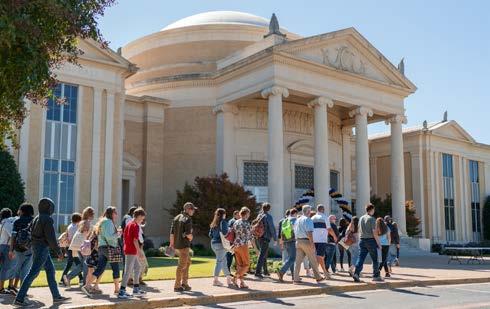
PROSPECTIVE STUDENTS ATTENDED PREVIEW DAY ON OCT. 21 where they visited with faculty, attended academic sessions, and met current students. The day culminated with nearly 650 people attending the seminary's fall festival.
pastor of Friendly Avenue Baptist Church in Greensboro, North Carolina, and president of the 2023 SBC Pastors’ Conference; Juan R. Sánchez, associate professor of theology and senior pastor of High Pointe Baptist Church in Austin, Texas; and Justin Wainscott, assistant professor of pastoral ministry and director of the Professional Doctoral Studies program.
David S. Dockery (’81), interim president of Southwestern Seminary, briefly addressed the gathering, encouraging them to reflect on Psalm 90:17 and pray daily for Southwest ern Seminary. Mark Dance (’91), director of pastoral wellness at Guidestone Financial Resources, provided a brief encouragement from the text of Acts 20.
McKellar introduced the workshop by first stating that “text-driven” describes expository preaching of a text that is derived directly from the Scriptures in the substance, struc ture, and spirit of the sermon, contrasted by
topical sermons. Even the title of the sermon often can come from the text of the sermon, he said.
“Often, the best sermon title is one that follows from the text itself. And so, I titled this message ‘To the Praise of His Glory,’” McKellar said, drawing from Ephesians 1:6a, 12b, and 14. “If you can’t summarize what you’re going to say in a single sentence, you’re probably not ready to preach the text of Scripture.”
McKellar also said text-driven preaching should let the text stand for itself, especially on difficult topics. “How should I preach the doctrine of election? The answer is, don’t do like a lot of people and skip over it. If it’s in the Bible, you ought to preach it,” he added. He countered also that there are “paradoxes” and “tensions” in the Bible on certain doctrines in Scripture.
Citing John 5:40 on willing and refusing to come to Christ, Joshua 24 on “choose this day whom you will serve,” and Acts 10:13 on “who soever shall call upon the name of the Lord,” McKellar said, “Wherever you are on the con tinuum, here’s what I’m saying to you: preach the text.” —T.M.
“SWBTS HAS A SWEET SPOT IN BOTH MY IMMEDIATE AND EXTENDED FAMILY. My father-in-law, Morris Wanje, was one of the first converts from the Southern Baptist work in the East African region. He is one of the greatest mentors in my Christian walk and works. His two sons, my husband’s older brothers, attended SWBTS in the late 80s and early 90s and again, they are two people I greatly look up to. When my husband and I were praying about seminary, there was no doubt in our minds that SWBTS was the seminary we desired to attend. When I think about my background and Christian faith, the one thing I wish I soaked myself more into is the Word of God. I am convinced as we build our belief in the one true God - God the Father, God the Son, and God the Holy Spirit - and why we believe, we experience an unexplained sweetness in life and godliness. My desire is to equip as many in understanding and walking in the Word of God as I possibly can. I have learned and have had avenues to practice expository teaching. I have had the experience to prepare and teach Bible study with women.”
1/ 2 /3/4/5/6/7/8
LILLY PARK Associate Professor of Biblical Counseling
“SOUTHWESTERN SEMINARY HAS A RICH HISTORY IN TRAINING MEN AND WOMEN to use their theological education and ministry skills to further God’s kingdom around the world. I’m grateful to teach at a seminary that upholds the authority of the Bible and emphasizes the Great Commission. Southwestern’s student body is diverse, providing students regular opportunities to be more equipped for cross-cultural ministry. Whether I’m teaching in the classroom or meeting with students, my desire is to encourage students to see all of life through a biblical perspective and to remember the great commandments, loving God and loving others.”
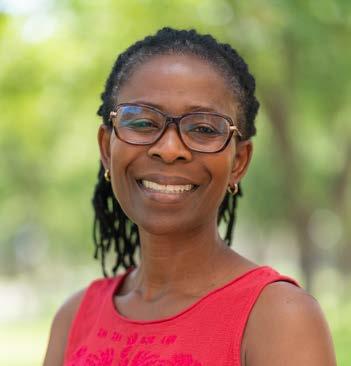
Southwestern Seminary exists to train people for the work of ministry. And it’s the people who make Seminary Hill a special place. It’s easy to see why.
“MY WIFE, NANCY, AND I HAVE SERVED THE LORD FOR ALMOST 50 YEARS. God led us to plant churches, and also to become heavily involved in short-term missions until He called us to full-time missions with the IMB. We were assigned to work with indigenous people groups in the jungle of the Amazon region of Brazil. God provided preparation through Southwestern as I completed two master’s programs. We realized more fully how SWBTS prepares missionaries to go to remote areas of the world to take the Gospel to the ends of the earth. That is why we give to Southwestern and praise the Lord for the opportunity.”
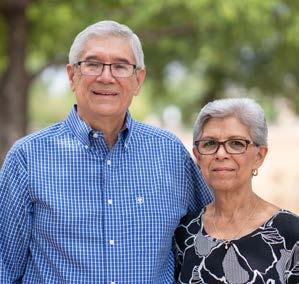
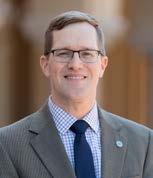 JOSHUA A. WAGGENER
JOSHUA A. WAGGENER
Professor of Church Music and Worship
“HERE AT SOUTHWESTERN, I ENJOY BEING SURROUNDED BY COLLEAGUES AND STUDENTS that are committed to learning, scholarship, and musical artistry—all in a Christian academic context that equips men and women for ministry. I desire to invest in students by helping them develop a vision for biblical worship, and, especially for doctoral students, to develop and share that vision through research, writing, and teaching.”
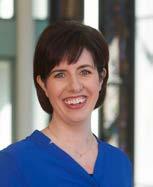
Master of Arts in Christian Education, 2002; Content Editor, Lifeway Christian Resources
“AS A TEENAGER, I FELT GOD CALL ME INTO FULL-TIME MINISTRY. After college and a year as a semester missionary with the North American Mission Board, I knew God was directing me to semi nary. Throughout my life, my dad shared stories of his time at SWBTS as a student. After hearing my dad’s experiences and knowing the School of Educational Ministries’ reputation as the best in its field, I knew SWBTS was the best place to prepare me for ministry. Through the
years of serving on church staff in the local church and training kids’ ministry leaders, and editing curriculum at Lifeway Christian Resources, I have been so thankful for my education at SWBTS. The friendships and networks formed during my seminary years have been and con tinue to be valuable to me both personally and in ministry.”
Donor; Master of Arts in Missiology, 2017; Master of Arts in Theological Studies, 2020“We realized more fully how SWBTS prepares missionaries to go to remote areas of the world to take the Gospel to the ends of the earth.”
1/2/3/4/5/6/ 7 /8
Master of Music, 2002; Pastor, Iglesia Bautista La Vid, Hurst, Texas
1/2/3/4/5/ 6 /7/8
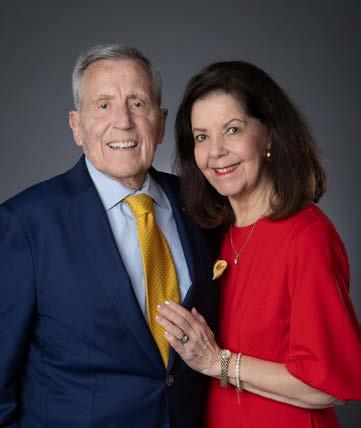
Bachelor of Divinity, 1965; Master of Divinity, 1977
“REGULARLY OUR MAILBOX IS FILLED WITH APPEALS FROM CHRISTIAN MINISTRIES asking for financial support. To us, none of them is as important as our local church and Southwestern Baptist Theological Seminary in Fort Worth. We have always given to our church and began giving to SWBTS some six decades ago. Our initial gifts to the seminary were so small, coming from a young Air Force couple, we wondered if they could really help. After all these years, God has made it possible for us to give much larger gifts. When I was a student in 1961, I worked as the seminary’s news director, graded mission papers for Dr. Cal Guy, and received a small scholarship. God and generous people made those sources of income possible for me to ultimately earn two degrees, a BD in 1965 and an MDiv in 1977. Ann and I wanted to do the same. Our small gifts and larger ones have added up over the years. Today, the Stricklin Corporate Chaplains’ Scholarship has several hundred thousand dollars in it. Every year scholarships go to needy students and their families… just like it did with us.”
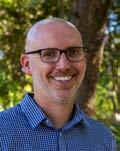
Doctor of Education Student; Master of Divinity, 2005
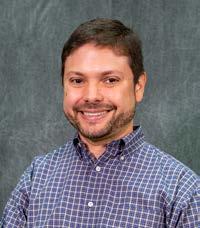
“I CHOSE SWBTS BECAUSE OF THE LONG-STANDING HISTORY OF EXCELLENCE in the School of Edu cational Ministries, as well as the new leadership that has reestablished the EdD at the seminary. I received my MDiv several years ago, and the Lord never released me to pursue doctoral studies. I did not understand why that was the case for years until the EdD returned to SWBTS. I love the
“ABRAHAM LINCOLN SAID, ‘GIVE ME SIX HOURS TO CHOP DOWN A TREE and I will spend the first four sharpening the axe.’ God has used SWBTS to help me sharpen the axe of ministry. Taking time to come and study at Southwestern has helped me become a more effective minister of the Gospel. I encourage anyone who wants to grind their axe for ministry to do so here.”
scholar-practitioner focus that they are actively developing at the seminary. As students, we have been pushed to expand our knowledge in a plethora of areas. In addition, the faculty that conducted the degree is exemplary. SWBTS has developed some of the most effective educational leaders over the last century, and the opportunity to be shaped and challenged has been a blessing.”
“Taking time to come and study at Southwestern has helped me become a more effective minister of the Gospel. I encourage anyone who wants to grind their axe for ministry to do so here.”
Southwestern Seminary’s world-class faculty produces world-class resources anchored in the Word of God to equip the church for ministry in the 21st century.
SEMINARYHILLPRESS.COM
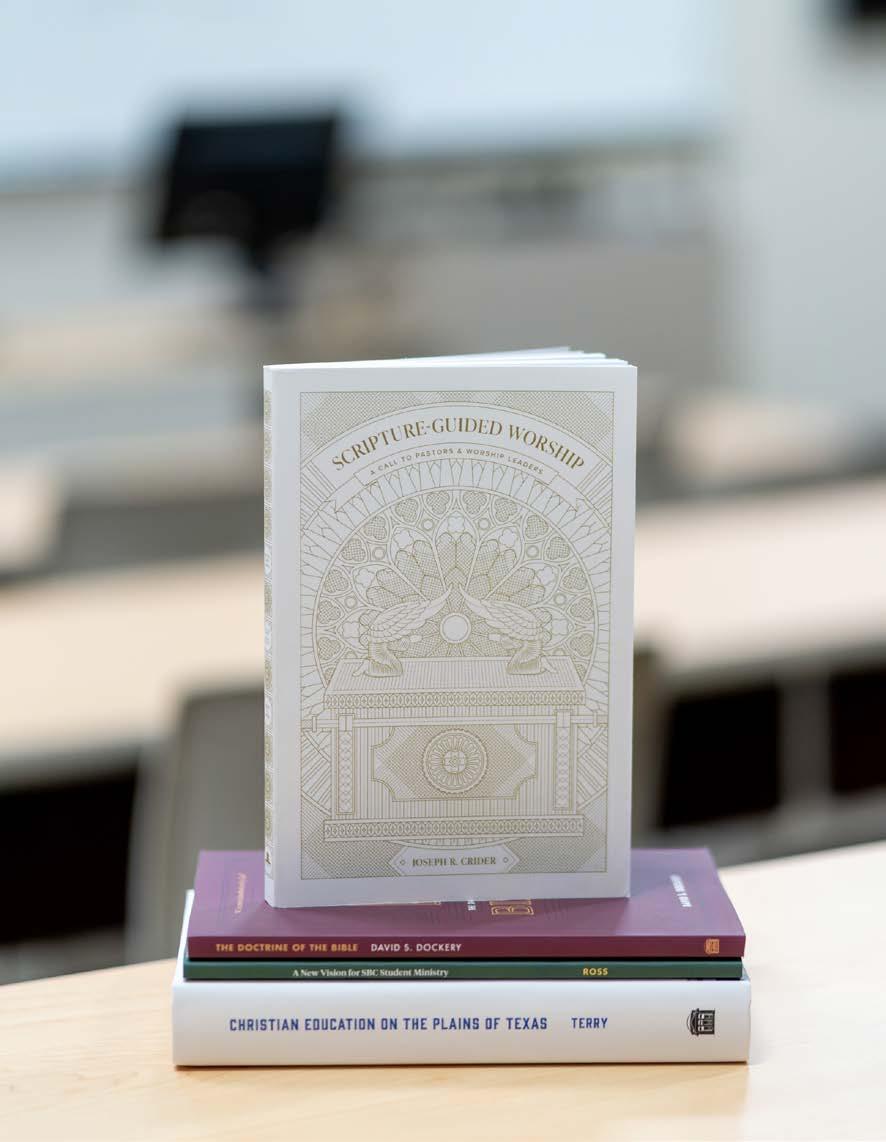
A FEW YEARS AGO, I WAS CONTACTED BY A CHURCH FOR ITS OPEN WORSHIP PASTOR POSITION. After a short phone conversation, we moved to the next step. Rather than audi tioning my musical skills, they asked me to answer 10 questions. This questionnaire pro vided clear proof that churches desire worship leaders to be able to do more than lead music.
1. Please explain your theology of worship, giving biblical support.
2. How does worship connect with pas toral care? Give examples from your ministry experience.
3. From what the Bible both describes and prescribes in terms of worship, which elements are most important in the church’s gathered worship? Please provide us with an example of an order of worship that you
recently planned and led.
4. If someone asked you to describe your strengths as a minister of music/worship pastor, what would you tell them? What are your areas of limitation in which you desire to grow?
5. Knowing the particular context of a church is vital for a member of the pastoral staff. Practically speaking, what would you do to get to know the context of our church?
6. Other than the Bible, list three or four books and/or authors who have been forma tive in your theology of worship and describe how/why they have been influential.
7. In what ways do you involve the congre gation in gathered worship?
8. How have you taught a congregation the importance of family worship and per

sonal devotional worship?
9. How do stylistic considerations flow out of your theology of worship?

10. Based on our church’s stated purpose of “_________,” please share how worship plays a role in fulfilling that purpose.
A worship leader/pastor who only focuses on music may struggle to answer questions like these. Worship leaders and pastors must receive pastoral training in addition to musical skills. Musical skills and leadership qualities are important, but a worship lead er’s biblical and theological understanding of congregational worship is equally if not more important. The way we think about worship is extremely important because the way we wor ship shapes our faith.
BROWN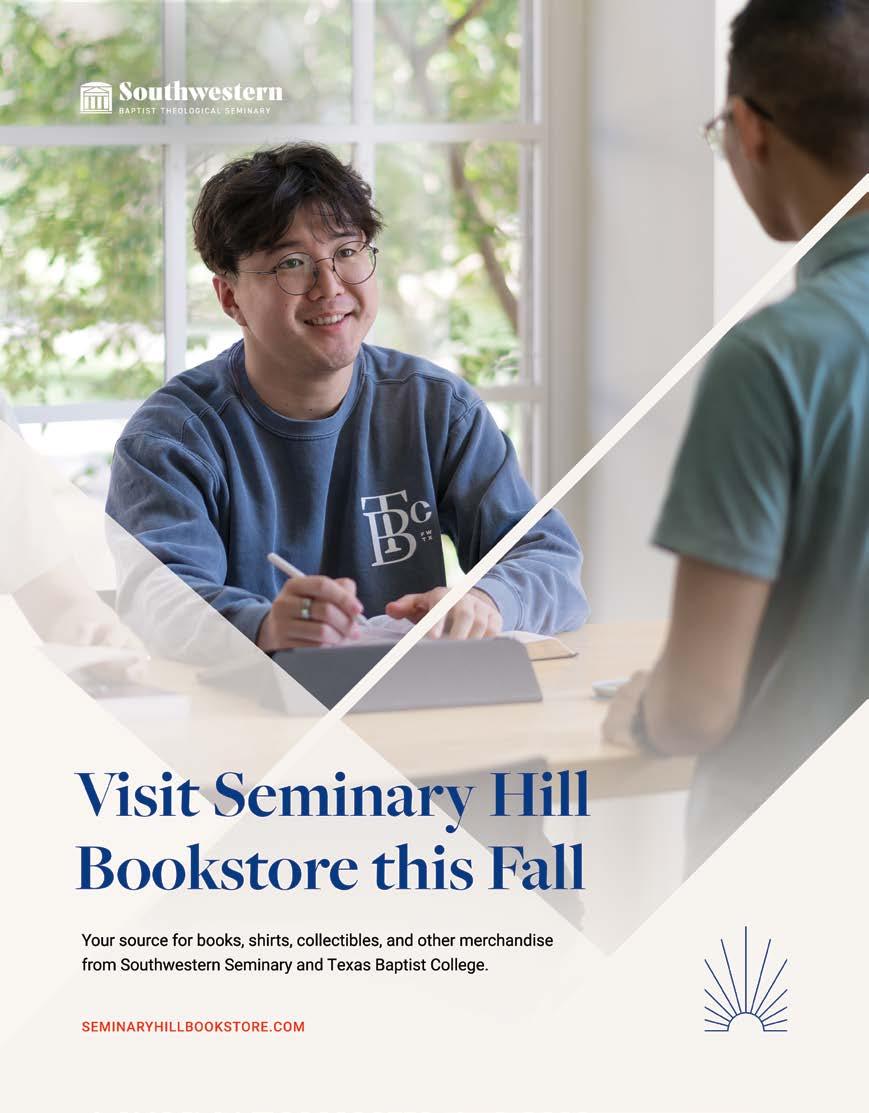
COWBOYS DROVE 14 MILLION HEAD OF LONGHORN CATTLE FROM TEXAS TO RAILROAD TOWNS between 1867-1887. The first major trail was the 1,000-mile Chisholm Trail through Fort Worth. Like cowboys herding cattle to market, Christian writers and speakers can move their ideas up the trail to people who need them.
Four images from the Chisholm Trail can help you make people remember your point:
1. Use the chuck wagon wheel. Writers and speakers communi

cate ideas, but important universal ideas are typi cally abstract—ideas people can’t see, touch, taste, hear, or smell. So, gain traction with your readers by using specifics to ground your ideas. Try using exam ples, a particular instance, numbers, quotes, testimo nies, comparisons, or even a metaphor. For example, if you were writing about dangers on the Chisholm Trail, you could use a specific danger, perhaps stam pedes. Stampedes started when cattle were startled by thunder, lightning, or even a cowboy’s sneeze. Or use a specific moment—once in 1876 a thunderstorm outside Waco caused 15,000 longhorns to plunge into a deep ravine, killing thousands of cattle and injuring many riders.
2. Use spurs. Writers and speakers can spur on sen tences using vivid verbs and dense nouns. When you’re revising your writing, replace weak verbs with ones with punch. Also avoid being verbs like is, are, was, were. Likewise, replace general nouns like rider with nouns packing more punch. Replace rider with cowboy, trail boss, or wrangler.
3. Longhorns have massive horns. Those horns lead to a point and so too should our messages. Ask your self in one sentence, “What exactly am I trying to say?” Write it in one sentence. Then rewrite it until it’s a clear, lean, meaning-packed point.
4. Use a harmonica. Cowboys played the harmonica to the cattle to minimize the risk of a stampede. Like wise, we can employ musicality in our messages to keep readers’ attention from diverting. How can you lyricize your writing? Read your writing aloud. Wher ever you stumble over your words, your readers (or listeners) will too. Vary your sentence lengths. Delete unnecessary words. Sentences crafted to engage the ear as well as the mind will keep readers on the trail of your writing.
The Chisholm Trail bears Jesse Chisholm’s name. Chisholm wasn’t a cattleman but a trader, trailblazer, friend of Native American chiefs, scout, interpreter at treaty coun cils, and linguist with a gift for diplomacy. His biographer called him the “ambassador of the Plains.” As Christian communicators we also want to be ambassadors. The chuck wagon wheel, spurs, longhorn cattle, and harmonica give us four images as tools to become clear and compel ling communicators for the kingdom.
AMY L. CRIDER serves as director of the Southwestern Center for Writing Excellence and associate professor of foundations of education at Southwestern Seminary.
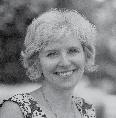
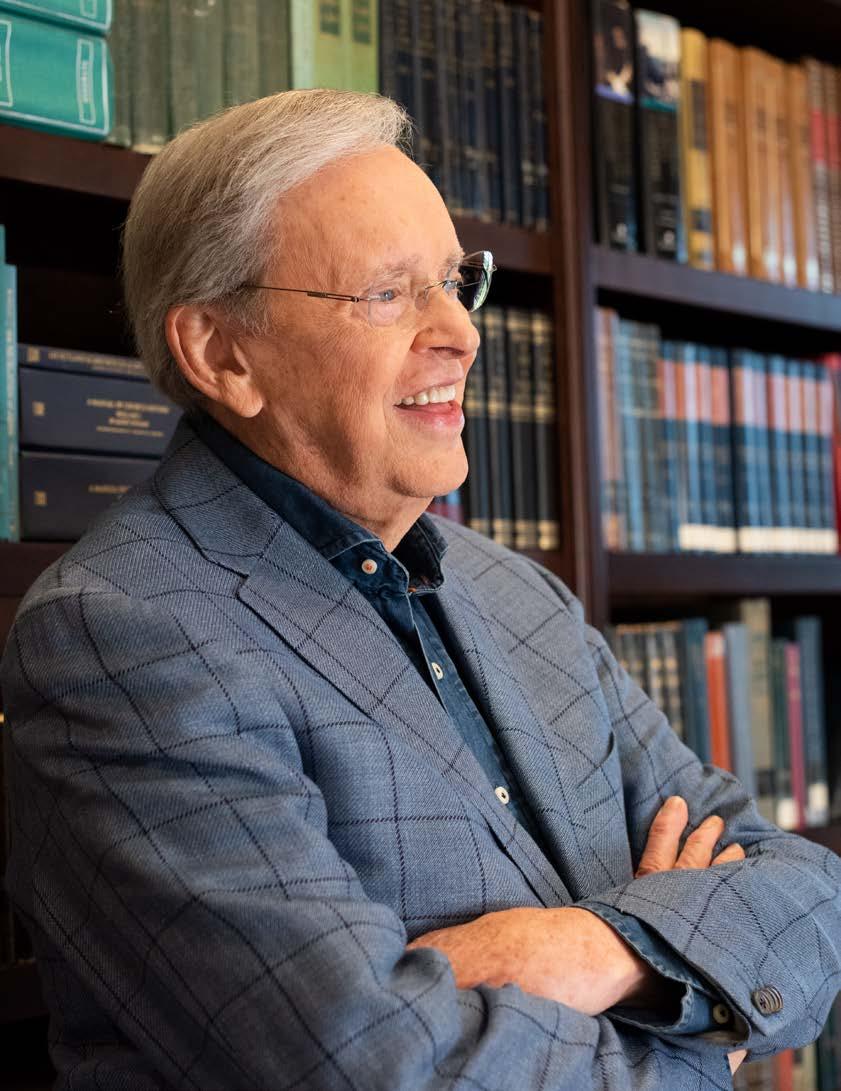

Charles Stanley’s obedience to the Lord yields fruit around the world
BY ASHLEY ALLENNestled in the Blue Ridge Mountains in Hendersonville, North Car olina, amid apple orchards, farms, streams, and trees whose orange, red, and yellow leaves merge to look like velvet rippling over the mountains in the fall, sits Fruitland Baptist Church. Pastoring the small church in a community of fewer than 6,000 people in the late 1950s is when Charles F. Stanley (’57) would have one of the most significant moments in his ministry.

With a recognizable voice that has never lost his native Virginia accent, Stanley has preached to millions of people worldwide during 60 years of ministry through his pastorates and In Touch Ministries, a global broadcast ministry he founded in 1977. But it was while leading the western North Carolina church as a new ly-minted Bachelor of Divinity graduate from Southwestern Baptist Theological Seminary that Stanley would have an experience that would lay the foundation for a lifetime of pastoral ministry and preaching.
Across the street from Fruitland Baptist Church is Fruitland Baptist Bible College, an institution that trains pastors for minis try through a two-year program. As part of his calling to pastor the church, Stanley was invited to teach classes at the school to approximately 150 men enrolled as students who were already pastoring churches, and “here I was, right out of seminary, never pastored a church, didn’t know anything about pastoring, but I knew God told me to do it,” he recalls.
“Here I was, right out of seminary, never pastored a church, didn’t know anything about pastoring, but I knew God told me to do it.”

Stanley explains he sought the Lord, kneeling on a blanket that his mother knitted for him that he still has, as he prayed, “I don’t know how to do this. I don’t feel worthy of it. I don’t feel like I’m really equipped. But I know if You gave me the opportunity, that’s what You want me to do.” He wanted to be “completely reliant on the Holy Spirit” and “under His control.”
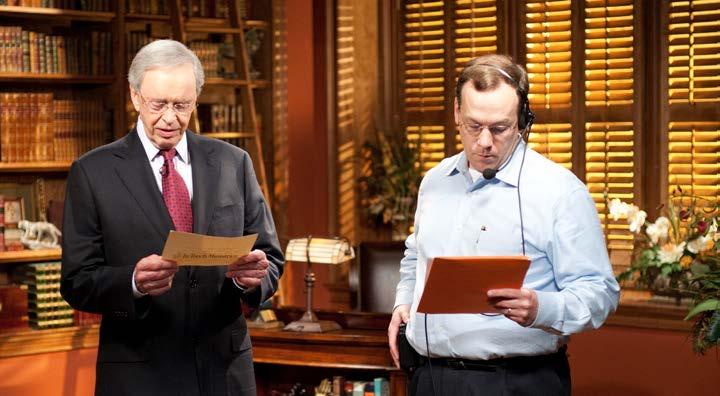
For the next two years, Stanley would pastor the small North Carolina church and not only teach his students the lessons of evangelism, preaching, and homiletics but simultaneously learn how “to defend what I believed in almost every class” as the stu dents had numerous questions, he says.
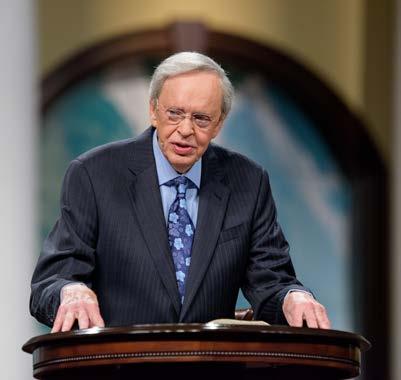
“It was a real challenge,” Stanley remembers. “But I felt the Spirit of God was in me and on me—and He’s the One who opened the door. That’s how I got started.”
Stanley, who would join the staff of First Baptist Church of Atlanta in 1969 and assume the role of senior pastor in 1971, a role he held until his retirement in September 2020 when he was named pastor emeritus, came to faith in Christ as a 12-year-old growing up in Virginia. His father passed away when he was nine months old and he was raised by his mother. And, since his birth was near the onset of the Great Depression, he explains, “we didn’t have a lot.”
As a 14-year-old, Stanley and his best friend Raymond were “sitting on the benches outside on the ball field.” Like many teen agers who wonder what they will do when they grow up, Stanley wondered the same about his friend as he asked, “Raymond, what are you going to do when you grow up?” The friend replied he did not know and asked Stanley the same question, to which Stan
ley replied, “I don’t know,” though, as he explains, he “was sort of afraid to say it,” although he later discovered both he and Ray mond “knew we were going to preach.”

Stanley earned his undergraduate degree at the University of Richmond and began as a student at Southwestern Seminary fol lowing graduation in 1954. Though there were seminaries “that were closer” to his Virginia home, he “found out that Southwestern was the most conservative” and “that’s where I went.”
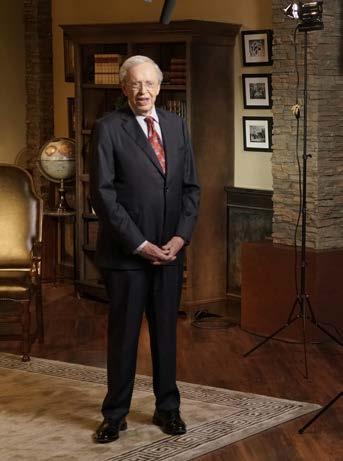
During his time of study on Seminary Hill, Stanley was influ enced by his preaching professor, H.C. Brown, who “was kind enough” to answer his questions, and Huber Drumwright, who would later become the dean of the School of Theology, but who as a doctoral student, taught Greek and New Testament to Stanley. The lessons Stanley learned in his preaching and Greek classes are those he still makes use of today. He explains that he was “influenced in lots of ways” while at Southwestern, but “primarily” through being “biblically sound.”
“I heard enough at Southwestern that I could defend what I believed,” Stanley observes. “I think that was powerful for me because people are always asking questions. And when people talk to me about going to seminary, I tell them to go to Southwest ern. I have recommended a lot of people to go to Southwestern.”
In 1972, while pastoring First Baptist Atlanta, Stanley began “The Chapel Hour,” which was a half-hour television program in the Atlanta area. He explains the “original vision” of what would, in 1977, ultimately become In Touch Ministries “was to get the mes sage outside the four walls of the church. And then, it was to get it out of Atlanta.” Following this prayer, Stanley began to ask God, “How do we get the message outside the four walls of the church?”
God’s answer would come as Stanley “was preaching Sunday after Sunday” and Pat Robertson, founder of the Christian Broad casting Network, contacted him and “said they needed some sermons.” Stanley recalls that he provided the sermons and “the program got popular pretty fast” which led to continuing the pro gram and “we began to grow.”
Reflecting on 45 years of ministry through In Touch, Stan ley says, “it wasn’t anything I was doing—I was just preaching the Word like He showed me to do.” With both the growth and advancement in technology, he “began to realize, as time changed, communications changed,” noting the computer, the Internet, and other advances. The realization made Stanley think, “Well, God, it’s possible to reach the world with the Gospel of Jesus Christ” explaining “that’s been my goal.”
“What can we do to reach as much of the world as possible in my lifetime?” Stanley asks.
Two years after founding In Touch, in 1979, In Touch magazine began as a newsletter and in 1980 “In Touch with Dr. Charles Stan ley” began airing daily across the United States through television and radio broadcasts. The ministry reports that Stanley’s sermons are daily broadcast globally to 3,600 radio, television, and satellite outlets and through the In Touch Ministries website, intouch.org.
Stanley quickly credits the Lord for what He has done through In Touch Ministries as he notes “there’s no explanation for what In Touch has been able to do except God. He has done it all. Nobody
“I think that was powerful for me because people are always asking questions. And when people talk to me about going to seminary, I tell them to go to Southwestern. I have recommended a lot of people to go to Southwestern.”
else can take credit for it.”
In September 2021, the board of directors of In Touch Foun dation, the charitable subsidiary of In Touch Ministries, approved full funding of the Charles F. Stanley Chair for the Advancement of Global Christianity at Southwestern Seminary. The Stanley Chair was the first fully funded, endowed academic chair at the current $2 million funding level in the history of Southwestern Seminary.

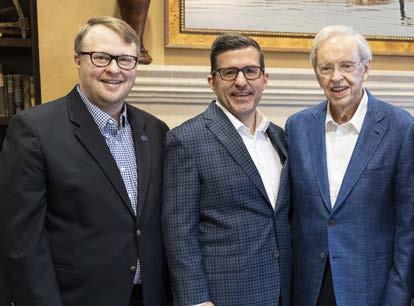
Stanley says being honored with the Stanley Chair left him “surprised.” He says the chair in his honor, which is held by John D. Massey, dean of the Roy J. Fish School of Evangelism and Mis sions, makes him think of “these young people who come from all over the world to study at Southwestern and to reach their people for Jesus.” He recalls when he “was starting out” and like many of the students who come to study at Southwestern, he “had nothing.”
“But there was a pastor—Reverend Hammock—who helped me,” he remembers. “He worked it out so I could have a four-year schol arship. So, I am very grateful to take part in helping these young people be able to do what God has called them to do.”
The impact of Stanley’s ministry extends not only through his broadcast ministry, but also through his writings. The author of several books, Stanley’s topics focus on “the questions that people have” and his desire to “clarify the topics that cause them confusion” as he desires to “help people with the difficulties they face daily,” most notably “in the practical things.”
“And I want to defend the truth of the Word of God,” Stanley concludes. Noting that “Scripture plays a role because it is the foundation of everything I write” because “Scripture is absolutely sufficient for every aspect of life,” he explains.
“Sometimes people say, ‘Well, I don’t find the answer for what I’m asking in Scripture,’” he adds. “Well, it’s not because it’s not there. It may be because you don’t know where to find it. And you should not be embarrassed or feel ashamed in any way to have to ask somebody, ‘What does the Word of God teach about this?’”
The authority and sufficiency of Scripture is a hallmark of Stan ley’s teaching, as evidenced in his sermons where he articulates the application of God’s Word to the practical areas of daily life in both theologically deep and understandable ways.
Standing on the Word of God is the first of five points of advice the 90-year-old Stanley says he would give young ministers today.
“Make the decision: ‘I believe this Bible from cover to cover. I do not doubt the Word of God,’” Stanley asserts. “I think you need to settle that right up front. If you don’t, you’ll have questions. Ques tions are fine. You’ll have questions. But if you start doubting the Word of God by listening to error, then you’re going to have a prob lem with your preaching—it won’t have any power. You’ll just be talking instead of expounding the Word of God.”
In addition to the authority and sufficiency of Scripture, Stan ley adds that reliance on the Holy Spirit, prayer, dying to self, and personal holiness are four other areas that are important to young ministers who are beginning in ministry.
Stanley says a “basic foundation” of preaching, alongside the Word of God, “is reliance on the Holy Spirit” adding ministers should begin sermon preparation by “asking His direction for the sermon” and “if you’re studying for a message, and God convicts
you, you stop . . . and deal with whatever God is convicting you about.” He says pastors who do not stop when the Lord prompts them will not “preach with power” and they will find themselves “preaching powerless ‘stuff,’ rather than the Word of God.”
The role of prayer in the life of a minister is also imperative, Stanley says, noting that young ministers “must recognize the power of prayer.”
“Whatever God does in your life, it will be directly related to how much time you spend with God in prayer, seeking His guidance and His direction, and being obedient to Him,” he observes. “Spend enough time on your knees talking to God and depending on the Holy Spirit—that will keep you straight. That’s the key. He will give you a clear vision of what He wants you to do.”
Additionally, Stanley says that a young minister needs “to be sure that self is not involved,” noting that he believes “there are many people that start out well, but pride is their downfall.” He adds goals of a young minister must always be “pure.”
“If you are seeking to grow a big church or get recognition, promotion, or financial gain, you are on the wrong track,” Stan ley cautions. “The Spirit of God will not bless that. You may impress people, but it will not be fruitful for God.”
Finally, Stanley emphasizes the “need” for a “holy life that
is based on the Word of God” and that also includes the “disci pline to be obedient to God.”
“Obey God and leave all the consequences to Him,” he con cludes. “To me, that is the secret of everything. Your whole the ology and faith are wrapped up in that. If you don’t obey God, all you’re proving is that you don’t trust Him. If you obey Him and leave all the consequences to Him, how can you fail?”
Stanley’s obedience to the Lord – traced all the way back to kneeling before the Lord as a young man in a western North Carolina town – has resulted in a fruitful lifetime of ministry that has resulted in Gospel advancement around the world. As he reflects on his decades of Gospel ministry, his hope is that his legacy is “that all of my effort had one ultimate goal: to reach as many people as possible, as quickly as possible, as clearly as possible, as irresistibly as possible, in the power of the Holy Spirit, to the glory of God.”
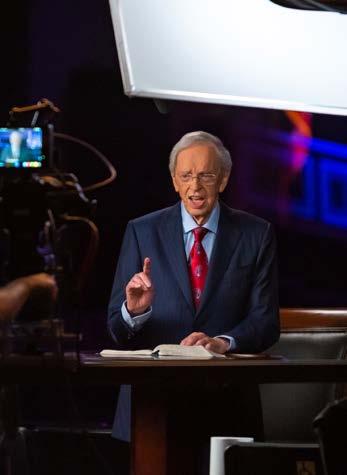
Ashley Allen (’03, ’09) is managing editor of Southwestern News.
Photos for this article were provided by In Touch Ministries.
“Whatever God does in your life, it will be directly related to how much time you spend with God in prayer, seeking His guidance and His direction, and being obedient to Him.”
The life and ministry of Charlie and Shannon Worthy
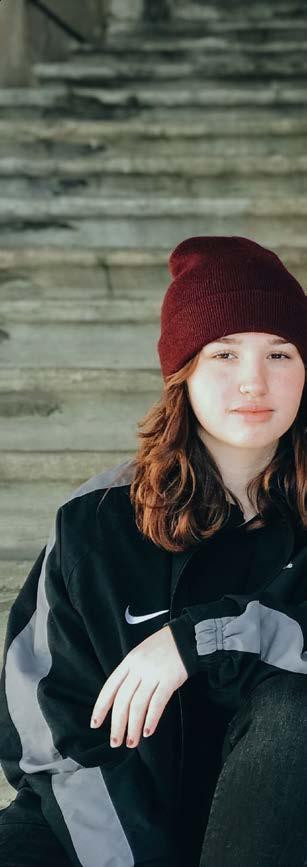 BY ELIZABETH BENNETT
BY ELIZABETH BENNETT
Charlie Worthy (’00), a missionary with the International Mission Board, has made his home in Italy for the past 20 years, yet his southern accent still shines through in his voice.
Charlie grew up on a farm in Tennessee and certainly knows the value of hard work. His grandparents instilled a deep faith in him from a young age. His great-grandparents were members of Merton Avenue Baptist Church in Memphis. Charlie’s entire family attended that church, and it was also where he was baptized.
When he was in high school, his pastor Roger Richards encouraged him to go to school, get a good education, and go to seminary. “He was a very wise man,” Charlie remembers today. He explains that Richards was a Navy chaplain who served overseas and served in ministry until he was 98 years old. Richards kept up with Charlie even after he went to seminary and lived overseas.
Today, the influence of family members and his pastor motivates Charlie in his current ministry assignment with the IMB recruiting hun dreds of young people to the mission field for short-term assignments knowing the impact the work can have on those lives—and on the King dom.
Charlie attended Union University in Jackson, Tennessee, and was blessed to have some good people mentor and disciple him. “It was through those experiences at Union University that led me overseas for the first time in 1992. I was at Union University and a young girl named

Star Walker put a Tennessee Baptist Convention (TBC) summer missions application in my hand and said, ‘You’d be a good person to go overseas.’ And I said, ‘I have no idea what that means,’” he recalls. Worthy completed the application and, in the summer of 1992, the TBC sent him to Puerto Varas, Chile. Charlie worked under IMB missionaries, Archie and Carolyn Jones. “Archie and Carolyn really took me under their wing and ministered to me that whole summer in Southern Chile. I really felt that God put a real calling on my life,” says Charlie.
In 1993, he was invited back to Chile where he served in Santi ago with Steve and Mary Jo Cook. “I really felt like this is what the Lord wanted me to do for the rest of my life,” Charlie remembers.
After the summer of 1993, Charlie returned to Union and upon graduation in 1994, he went on to serve in the IMB’s journeyman program in South Africa for two and a half years. He was a part of a vocational training institute where they trained over 1,000 people a year. “It was a really amazing experience. I went out there as a kid and I came back as a man. It was through those experiences, gradually walking through one door after the other, that the Lord opened the door to ministry and mission opportunities that He affirmed time and time again,” Charlie says.
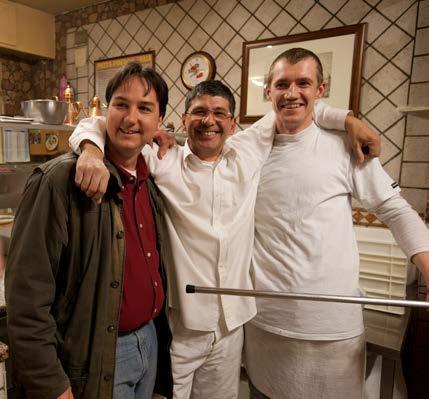
While he served in South Africa as a journeyman, Kenneth S. Hemphill came and spoke at a mission meeting. Hemphill was serving as the president of Southwestern Seminary at the time and he and Charlie spent a day together. Hemphill encouraged him to go to Southwestern and was “very influential in getting me here,” he recalls.
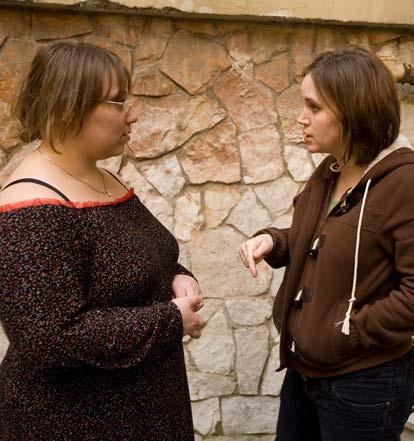 CHARLIE WORTHY
CHARLIE WORTHY
Charlie arrived at Southwestern in 1997 and graduated in December 2000. “My time at Southwestern was a really, really good experience,” says Charlie. He knew that missions was what he wanted to do and felt called to be, but he under stood the value and importance of earning his Master of Divinity degree at Southwestern.
Charlie’s seminary career was funded by scholarships that were found by Hemphill and several churches that sup ported him. “I will never forget those small churches that helped cover the cost of my tuition and books as well as the bulk of my housing,” Charlie adds. “It was a blessing as
“Archie and Carolyn really took me under their wing and ministered to me that whole summer in Southern Chile. I really felt that God put a real calling on my life.”
somebody going into missions to be able to have the finan cial aspect of it covered, not just by Cooperative Program funds, but by folks like Dr. Hemphill, who really took care of me. I pray I have been a good steward of that investment for the past 20 years,” he says.
Charlie remembers fondly a few faculty members who were most influential to him. One of his favorite classes was biblical backgrounds with Tommy Brisco (’73, ’81). “I thank him for investing in me, helping me see the Bible in new ways,” Charlie remembers.
Also, Senior Professor of Christian Ethics Bill Goff (’65, ’76) and his wife, Emilee, “were missionaries who personally took a shot and really took an investment in my wife and me. They took care of us, provided meals and just everything else all through the years” as he remembers the “personal investment of many of the professors” at Southwestern.
Charlie says the theological grounding at and academic credentials from Southwestern “helped give me the tools I

in.”
Charlie and his wife, Shannon, met while they were both students at Southwestern. “We both had completed our journeyman service and were in the initial days at the semi nary with fellow journeymen. There was a camaraderie with the six or seven of us due to our time overseas. Shannon and I were in different classes, but our mutual friends intro duced us. From those early days on, we had an immediate connection,” remembers Charlie.
Shannon grew up as a missionary kid in Guatemala and the American culture never quite felt like home to her. “I grew up in a third-world country and so the whole mind set was different. My friends back then were talking about buying a $50 pair of jeans and to me, that was outrageous. I knew how to be in that culture, but it was not my heart’s

“It was a blessing as somebody going into missions to be able to have the financial aspect of it covered, not just by Cooperative Program funds, but by folks like Dr. Hemphill, who really took care of me. I pray I have been a good steward of that investment for the past 20 years.”
CHARLIE WORTHY
calling. I struggled a lot with wondering if God was calling me back in the mission field or if it was just because I was comfortable on the mission field,” Shannon says.
After wrestling with direction, Shannon decided to do the journey man program and explore what she was feeling in her heart and dis cerning God’s call for her life. She traveled to Spain to teach at a school and help plant a church. “That’s when God pretty much said, ‘No, this is really what I have called you to do.’” Shannon was the first missionary kid to be a journeyman whose father and mother had both also served as journeymen. Her dad, Joe Bruce, graduated from Southwestern with a Master of Divinity in 1971 and Doctor of Ministry in 1981. Bruce com pleted 38 years of missionary service through the IMB in 2013.
Following journeyman training, Shannon was encouraged to go to Southwestern. Upon meeting Charlie, “I told him right away that I was headed back to the mission field,” says Shannon.
Charlie and Shannon’s heart for missions was reflected in the time they spent serving together at Mission Arlington, a ministry in the DFW Metroplex, that seeks to share the Gospel of Christ with the commu nity as they meet practical and physical needs. They enjoyed volun teering there during their time at Southwestern. Charlie remembers it being a good experience as he went into lower-income areas and invested in people several times a week. The couple was in charge of doing Bible studies for kids at an apartment complex. “That’s where we started working together and eventually fell in love,” says Shannon.
The Worthys were married in 1998 at Woods Chapel Baptist Church in Arlington, Texas, and now have four children who have been raised on the mission field.
During spring break 2000, Charlie had the opportunity to lead a team of Southwestern students to work with the Bedouin peoples of the Sinai. “I will never forget that week, serving in the Sinai Desert, sitting on top of Mount Sinai, walking in the tents, and eating a meal under the stars.” Although he has lived in Europe for 20 years, “I still pray for them to this day.”
The Worthys were appointed as IMB missionaries to Italy in 2002 when their first two children were two years old and 18 months old. In 2004, they moved to Rome for about six months to learn the language,
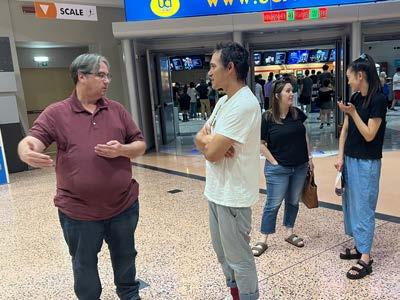
and then they moved to Naples, where they served for nine years. “It was exciting. We saw God move in many ways,” Shannon remembers. Charlie’s role changed so they moved to Arezzo so they could be in a more central location in Italy, and it is where they have remained since 2012.
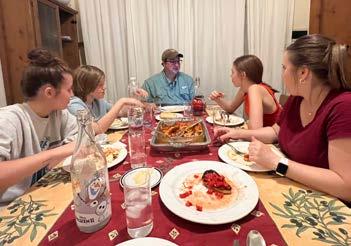
Shannon’s greatest joy and passion in ministering in Italy for the past 20 years has been building relationships with the local people and encouraging them. “Just walking down the street and saying ‘good morning’ and then trying to start a conversation brings me joy. I really like being able to hear about other people, encourage them, and pray for them,” she says. As part of her role as an IMB education consultant, she is able to be an encourager as she comes “alongside to support and encourage the families as well as help with resources and mate rials.”
Charlie feels privileged to serve as the student mobilizer for the IMB. He recruits hundreds of college students to serve a six-week internship in the summer, as well as semester missionaries. “We’re bringing over high school teams and short-term university teams” to Europe, Canada, and Australia. Post-COVID-19, summer 2022 has been a “restart” for his work in Europe with 450 students serving, he notes. “It’s been such a joy to help recruit and open up opportunities for our SBC churches and students to come and serve with us,” Charlie
“Just walking down the street and saying ‘good morning’ and then trying to start a conversation brings me joy. I really like being able to hear about other people, encourage them, and pray for them.”
exclaims.
Charlie recruits college students to serve overseas through the SBC’s networks, including through his colleagues across Europe who are working and developing job opportunities. “By developing these specific job opportunities, it is great news for students coming to work,” he explains. The job opportunities cover a variety of fields such as agriculture, medical, engineering, education, and counseling. Once the job opportunities are created, Charlie then turns to churches, Baptist collegiate ministries, state conventions, and local associations, and the student department of the IMB compiles all the requests and recruits people. Charlie attends several events throughout the year to help recruit, too.
Charlie’s experiences going overseas during summers in college as a summer missionary and as a journeyman helped influence what he is doing today helping get college students to serve overseas. “I really did gain the importance of short-term missions and what it plays not just in people’s lives, but the impact it has to the missionary field,” he observes. “It was definitely influential. It was very refreshing when we lived in Naples to have volunteers from America come and serve. We saw a significant number of students. I remember my first high school team, and we had 126 high school students come and serve. That was trial by fire. But we had some amazing experiences with students then and still do today.”
Charlie notes for him “going to seminary wasn’t just an academic exercise.” He explains, “It was important to be involved in hands-on ministry” while he was a seminary student, a trait that has remained as he serves today as he is “involved in the heavy administration load
both here and on the field. I am still out there working with our local believers. We’re still out there doing job one, which is evangelism.”
Charlie and Shannon are grateful for Southern Baptists as their life experiences, education, and ministries are tied to the SBC. “I truly want them to know how grateful we are for their sacrificial giving which allows me and my family to be out here,” he says.
Charlie realizes that the cost of volunteer missions can be expen sive, but he encourages more people to come out and serve with them, even if it’s for a few days or a week. “Sometimes volunteer missions may seem futile, but walk alongside us in the streets, eat a meal in our homes and pray and worship with us side by side. I wish Southern Baptists knew how much we wanted them to come and walk with us,” Charlie implores. “As a missionary in Europe with the IMB for 20 years, we really want to see more folks come and serve with us long-term. We are really looking for more folks from Southwestern to come and serve with us on the field. We need more people and we want more people,” Charlie urges.
The faithful influence of Charlie’s parents and grandparents while growing up on the farm in Tennessee provided a firm foundation for his life and his favorite Bible verse, John 16:33, brings hope to his soul with a message he strives to share with the world. The legacy of faith from his family continues to reach new generations to this day.
Elizabeth Bennett is a news writer for Southwestern News.
Some photos for this article were provided by the International Mission Board and Lifeway Christian Resources.
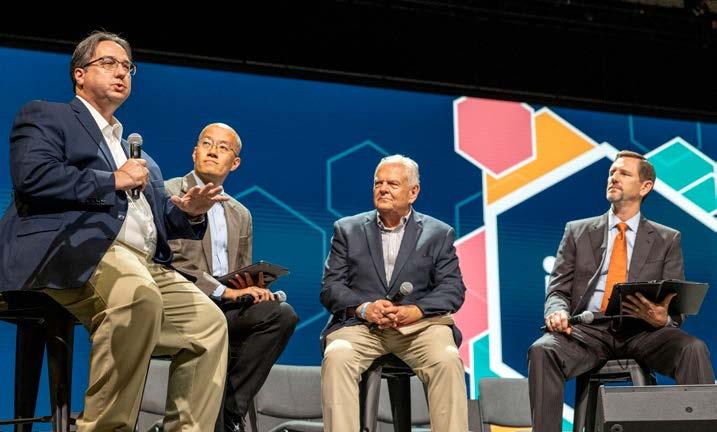
 BY ASHLEY ALLEN
BY ASHLEY ALLEN
At the start of the winding, gravel road that leads into Mt. Lebanon Baptist Encampment in Cedar Hill, Texas, is a weathered wooden sign that reads, “Where People Meet Jesus.” As a rising eighth-grader attending her first-ever church-related event, the sign proved prophetic for Michelle Hicks (’89). When her classmate invited her to take part in a youth camp at Mt. Lebanon the summer following seventh grade, Hicks said, “yes.” The native Texan who was living in Garland, just outside of Dallas, “didn’t grow up in a Christian home” and her family did not go to church, but that summer at camp she heard the Gospel and accepted Christ as her Lord and Savior.
Hicks, who has served since 2020 as the managing editor of Journey, Lifeway’s devotional magazine for women, and is a trainer with Lifeway Women’s ministry training team, did not know at the time how the Lord was ordering her footsteps for a lifetime of ministry. The friend who invited Hicks to the camp was the daughter of the then-pastor of Calvary Baptist Church in Garland. He followed up with Hicks to ensure she understood the decision she made, and she followed the Lord in baptism, but as Hicks explains, it wasn’t until she began as a college student at the University
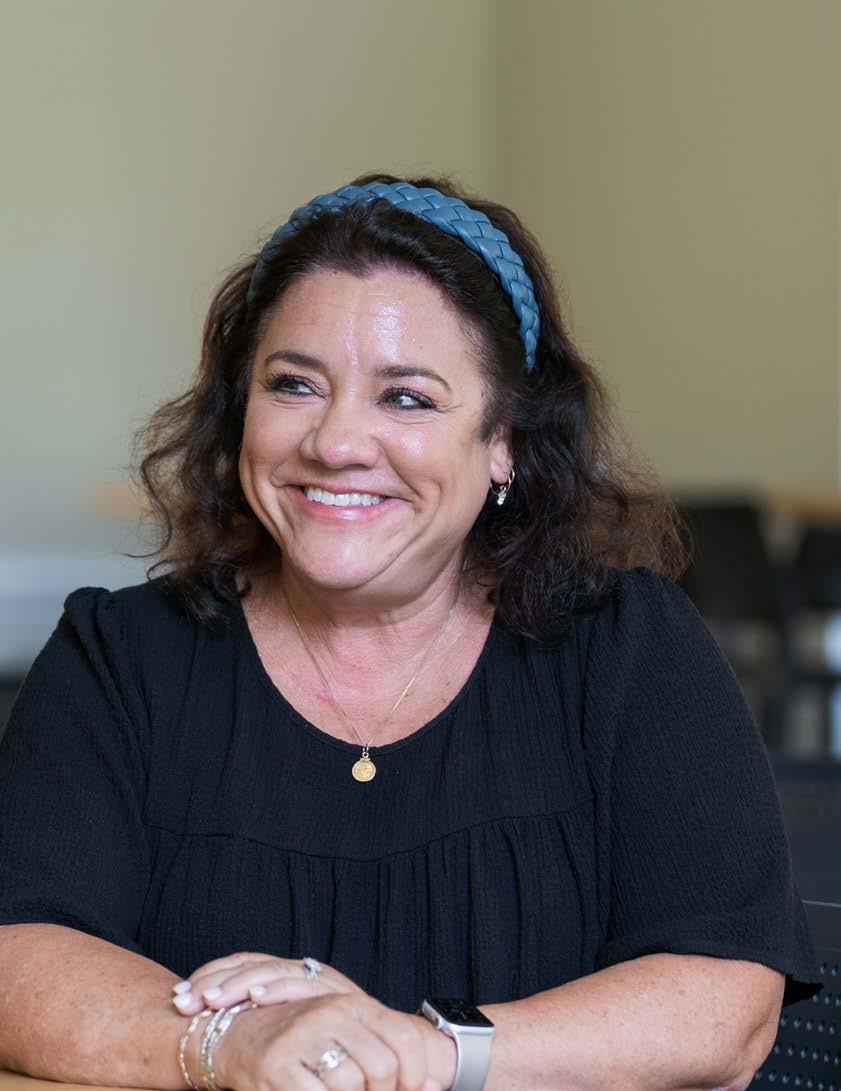
of North Texas that she began to grow in her walk with the Lord as He “put me in the right place at the right time with the right people that were believers that loved Him.”
While in college, she began driving herself to Arapaho Road Bap tist Church in the Dallas suburb of Richardson and getting actively involved in the church’s ministries. As she was serving, she says she was “learning” and “being discipled” alongside other people. However, it was during her junior year of college that her “life really took a turning point” as she “sensed” the Lord wanted her to serve Him in a different way. Hicks graduated from UNT with a Bachelor of Business Adminis tration in computer information systems and “felt called to ministry.” The ministerial staff at her church, including her pastor, were all South western students and encouraged her to apply for admission to the seminary. She explains in her application essay she wrote, “I have no idea what the Lord wants me to do,” simply because she “did not know what opportunities there might even be for women.”

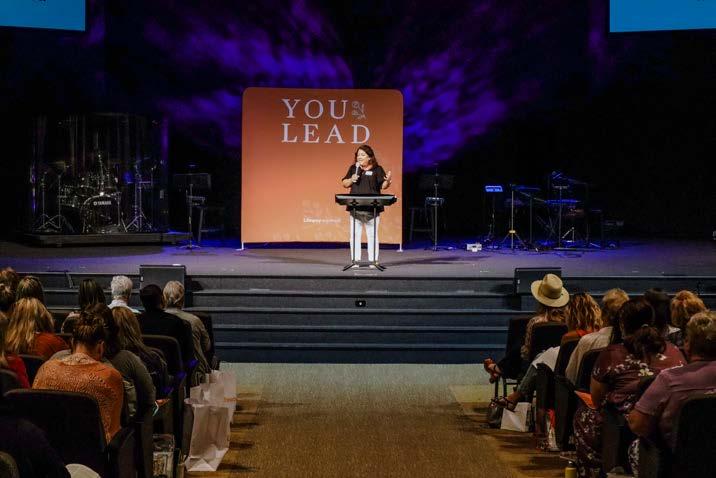
Once Hicks began as a Southwestern student in the fall of 1986, “the Lord really used” her years on Seminary Hill as she took education classes with Jack D. Terry Jr. (’62, ’67), evangelism classes with the late Roy J. Fish, and New Testament with the late Jack MacGorman. Along with the late Phil Briggs and retired Professor of Student Min istry Wes Black (’78, ’85), Hicks said they were among a “number of professors” who “really poured” into her as she “was so eager to learn.” She also served as the only female student ministry intern at Travis
Avenue Baptist Church in Fort Worth while she was a student.
Among the many skills Hicks learned at Southwestern was event planning - skills she still uses today as she serves women across the United States through Lifeway. In 1989, she was the co-director of Youth Lab, a nationwide youth ministry conference that was organized and planned by Southwestern Seminary students. Hicks said during her time of seminary study her “heart for Jesus and love for the church grew” and she realized what she “may have missed out on the first 20 years” of her life, the “Lord provided [it] all” in His timing through churches that discipled her and what she was learning through her seminary studies.
At Southwestern, Hicks met her husband, Joe (’90), and following her graduation with a Master of Arts in Religious Education degree and his with a Master of Divinity degree, the couple married and moved to Nashville so he could complete an internship with the then-Baptist Sunday School Board. Over the course of the next several years, Hicks would serve as a campus minister at Palm Beach Atlantic University in West Palm Beach, Florida, until the Lord called her husband to serve with the California Baptist Convention as the program director of one of the convention’s encampments.
While the couple was serving in Florida, Hicks was contacted by Richard A. Ross (’74, ’80), senior professor of student ministry who was serving as the youth ministry consultant at Lifeway Christian Resources at the time. Hicks was serving in student ministry and help
ing with Lifeway’s Fuge Camps for youth. Ross asked Hicks to write an article for student ministers. What began as one writing assignment soon multiplied as Hicks began to receive more opportunities to edit, finesse, and, at times, rewrite another contributor’s curriculum if it was “too academic” or if the curriculum lacked the necessary learning ele ments for the student - things she acquired during her study at South western. When she was living and serving in California, Hicks wrote for West Coast publishers, including Group Publishing, David C Cook, and Gospel Light. After Joe was called to serve as the manager of Lifeway’s Fuge Camps, the couple returned to Nashville.
Upon resettling in Tennessee, Hicks began serving with Marketplace Ministries, now Marketplace Chaplains USA, ministering to women in the workplace in the Nashville-area. At the time, Lifeway Women was a young ministry that was just beginning to publish women’s Bible study curriculum and host women’s enrichment events across the country. In 2005, when the need arose for decision counselors for one of the events, Hicks volunteered to help. However, what began as helping with altar calls and connecting women with local churches “on a week end here or there with events,” became a part-time, then full-time role with Lifeway.
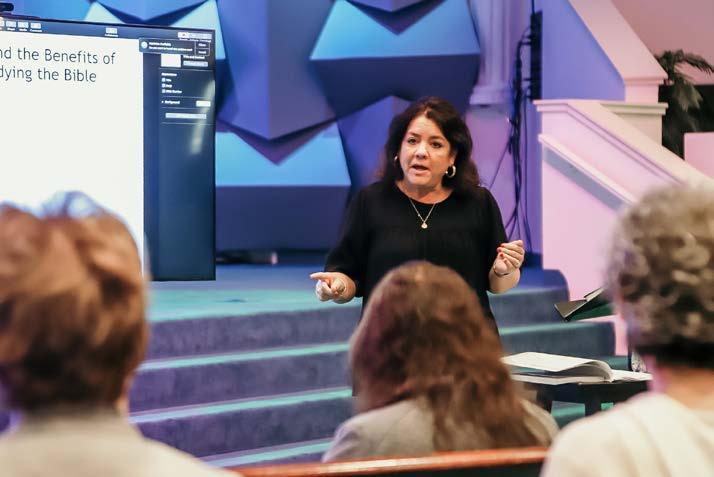
Hicks began as a part-time event project coordinator with Lifeway Women in 2007. In the role, she worked from the home office in down town Nashville planning and coordinating the details of the ministry’s nationwide training events, while also continuing to help with altar calls at on-site events. In 2012, she began serving in a full-time role for the ministry’s Bible study curriculum, first as the team leader and then as the manager. For the next eight years, Hicks spearheaded the
team that published Bible studies for women. Simultaneously, though, Hicks’s father passed away, her mother relocated from Texas to Nash ville, and she was helping care for her in-laws.
In February 2020, six weeks before COVID-19 shuttered everything worldwide, Hicks made the transition to managing editor of Journey devotional magazine and to serving with the Lifeway Women train ing event team. The change in roles allowed her to work from home – before it became the “norm” – while she provided care and assis tance to her family members. Hicks explains the transition has been “so fun because it combines” her “love for writing and publishing with the event side” as she serves through Lifeway Women.
As a trainer with the Lifeway Women’s team, Hicks travels to loca tions throughout the United States to teach local church women’s min istry leaders through “You Lead.” Through the one-day event designed to equip women in leadership, Hicks leads breakout sessions that enable a woman to grow in her walk with Christ, learn and enhance her leadership skills, and help move the women’s ministry forward with an emphasis on impacting and reaching the woman in the pew.
Simultaneously, Hicks leads the team that publishes Journey devo tional magazine.

Journey, which will celebrate its 30th year of publication in 2023, was started in 1993 by a group of women with “the dream” to provide “a daily devotional for women, written by women” so that they could help other women be in God’s Word daily, Hicks explains. Almost three decades later, she says, “it’s stayed true to that” original goal.
The magazine, which has a readership of over 105,000 women worldwide, is written by a variety of female contributors, some who
have theological education and some who do not, but who range in age from their early 20s to their 70s, Hicks says. The devotional writ ers include married women, single women, moms, grandmothers, and women who work outside of the home as nurses, teachers, and profes sors, she adds.
The contributors are “women who love Jesus and want to be in God’s Word every day” and who want to help other women do the same, Hicks says. The content is “new content every day, every month” since its beginning, she adds. The format of the daily devotional includes a key verse of Scripture, a short devotional that makes application of the Scripture, a one-sentence prayer, and a reference to a longer passage of Scripture.
For Hicks, the opportunity to help impact the lives of women with the Word of God is an “honor,” as she recognizes there are women who read the devotional magazine who did not grow up in a Christian home.
“I’ve loved it so much and I think because I come from that back ground of not having a solid church background growing up,” Hicks explains. While she knows there are women who read the devotional magazine who were raised in a Christian home and have been believ ers for a long period of time, she knows there are women who are “kind of like” her. In providing leadership for the magazine, she says she has the “huge responsibility” for making certain the readers are “getting solid, sound theology” in what they are reading coupled with a “correct interpretation of God’s Word.”
Hicks says she is mindful of answering to the Lord for the maga zine’s content and impact while simultaneously appreciating the “faith fulness of the Journey readers.” The testimonies readers send to Hicks remind her of how God is using the devotional in the lives of women. One reader sent Hicks a picture of 24 years’ worth of the magazine with the issues bundled by month. Another reader and her mother received copies of Journey at their church. When the mother passed away, her daughter found the names of people her mother was praying for written in the margins of her saved copies of the magazine.

The devotional magazine has also been used on a number of mis sion trips including one trip where the team members “basically tore
out the pages so that every woman in the group could have a devo tional page and then they would trade them around,” Hicks adds.
Since its inception, Journey has been published as a monthly mag azine, however, due to ongoing postal problems and delays, Hicks led the team to transition the magazine to a quarterly publication beginning in fall 2022. Changes in technology have also allowed for a change in distribution as readers can subscribe to a digital version of the devotional magazine and in the future will be able to access the material on the Lifeway Women app for smartphones.
Hicks says the devotional magazine is important because it helps “women be in God’s Word every day” and is “something that speaks to their heart.” She says the material allows her, personally, to reset her “focus for the day” in a “shorter period of time” as it is a daily “reminder” as she says to the Lord, “I’m Your’s.”
The same perspective is what she sees in readers who “don’t have a lot of background in knowing Scripture” as Journey provides a “very non-threatening” way to read a devotional while also helping a woman grow in her walk with Christ.
“I think it does help develop that personal relationship with Jesus,” she says. “I love that even a brand-new believer can pick up a small, one-page little devotional” and read one verse or passage and see “how God is working in someone else’s life or how He’s working in a situation or … how He was working in Scripture.”
Reflecting on how her own personal journey with Christ began as a seventh-grader at Mt. Lebanon, Hicks recognizes the importance of God’s Word in her life.
“God’s Word is just air to me,” she concludes. “It really is because I don’t know what I would do without the Lord and to know that He has spoken and He speaks to us through His Word” has given her “the boundaries and the foundation of everything” she has needed in life.
Ashley Allen (’03, ’09) is managing editor of Southwestern News.
Some photos for this article were provided by Lifeway Christian Resources.
“God’s Word is just air to me. It really is because I don’t know what I would do without the Lord and to know that He has spoken and He speaks to us through His Word” has given her “the boundaries and the foundation of everything” she has needed in life.

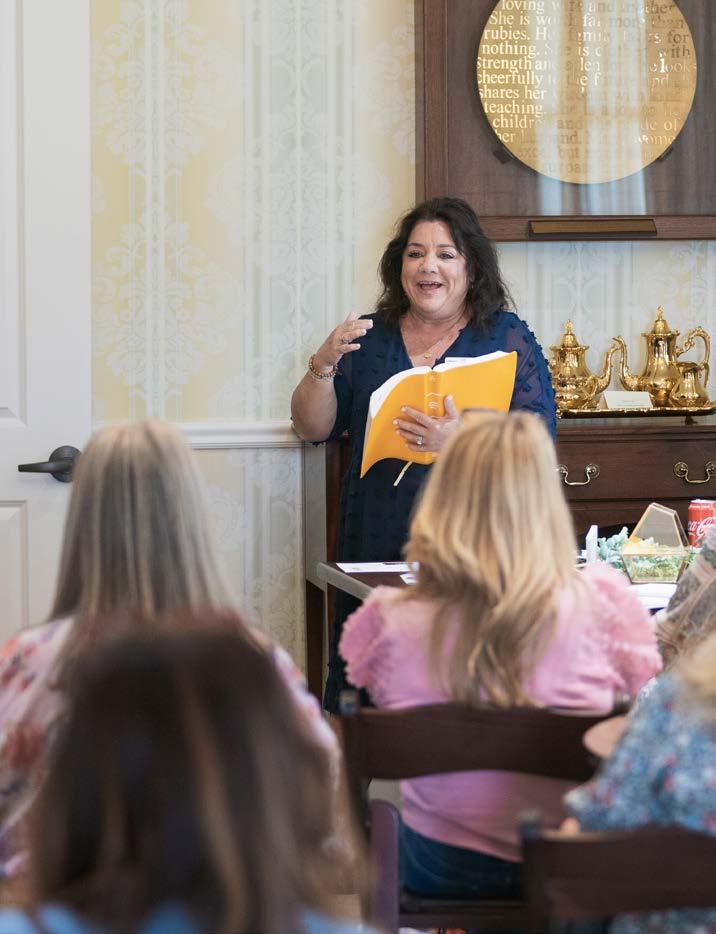

The role of biblical mentoring in Jonathan Coleman’s life and ministry
STORY BY TIMOTHY MCKEOWN PHOTOS BY CHINSOP CHONG
From the Friday night lights of high school football to the flaring flames atop oil rigs of the Permian Basin, a Southwestern Baptist Theological Seminary grad is looking to increase the light of Christ and spiritual fire through mentoring men at his church in Odessa, Texas.
“I’m a redneck from the south, and God’s placed me with roughnecks in Midland-Odessa,” says Missis sippi native Jonathan Coleman (’12), pastor at Mission Dorado Baptist Church, who is taking seriously Christ’s call for discipling the often transitory, mostly oil field workers of west Texas.
At 6 a.m. on Tuesdays, Coleman meets with men, ranging in age from their early 20s to mid-30s. Trans formative discipleship in a transitory community like Odessa is difficult, Coleman says, but he is undaunted.
“One church here said they see a 15 to 20 percent turnover every year,” Coleman states. “Ours is not that much, but we get young guys in their twenties. We have them for a short time but while we have them, we pour into them.”
Coleman uses the terms mentorship and pouring

into people because people understand it more than the word dis cipleship. “I will say, ‘I want to mentor you. I want to show you how to love Jesus more tomorrow than you did today,’” he explains.
Doing biblical mentorship is not just a goal Coleman has for training disciples and future ministers. It is a vital part of Cole man’s own testimony of experiencing generational discipleship in his journey to becoming a pastor.
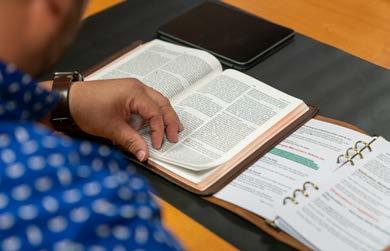
The son and grandson of ministers, Coleman was mentored throughout his life, as a minister, as a student at Southwestern, and at his current church before becoming the senior pastor. Now he is pouring into the lives of young men the lessons he has learned.


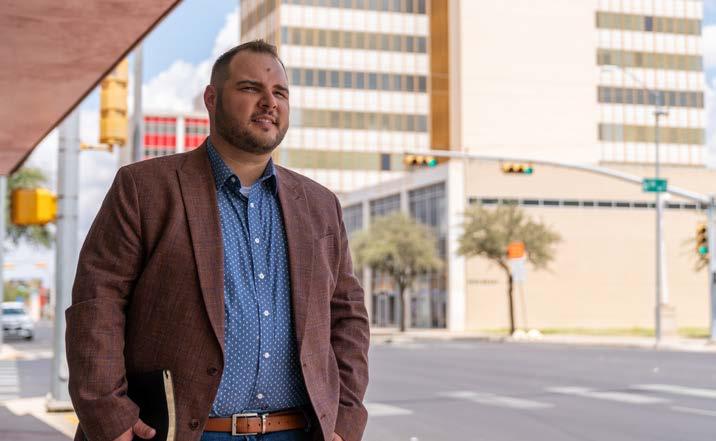
“When I preached in view of a call, I said, ‘Church, this is what it is supposed to look like. Pastors need to be raised up in the church because they are being produced by the church. If the church is obedient, we should never need another search commit tee,’” Coleman recalls.
“One of our visions is we are a church producing the next gener ation to glorify God. I needed generational discipleship, and every one needs to be mentored and to mentor someone else,” reflects Coleman, who came to the church in 2018 to be mentored to become a senior pastor, somewhere. He said he never dreamed his senior pastor position would be at Mission Dorado.
Coleman has learned not to be surprised by God’s surprises. In tenth grade, he told his father that he would never go into ministry. His church experiences as a pastor’s kid were “not the best of experiences.”
Though he had felt called to ministry, Coleman told God “no” until after his senior year of high school, when he submitted to the Lord’s leading following youth camp.

Gifted in music, he earned a music degree from Mississippi College in Clinton, Mississippi. However, a church counseling sit uation revealed to Coleman that he had no biblical advice to give. “I thought to myself, I need to get more education in ministry and counseling,” Coleman says and enrolled at Southwestern.
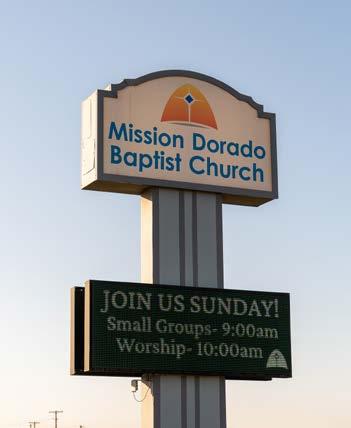
Coleman wanted an education taught by people who had church experience, like Gordon Borror, a former Southwestern pro fessor of music (2001-2010) who previously served as a pastor, something that impressed Coleman.
Music had always been important to Coleman, having been saved as a seven-year-old who was practicing for a Christmas musical. Not understanding the importance of Jesus’s birth, “I asked ‘why don’t we have musicals about my birthday,’” Cole man says. “My mom shared the Gospel with me, and we kneeled beside my bed to ask Christ into my heart.”
While in seminary, Coleman served at Oak Crest Baptist Church in Midlothian, Texas, as minister of music and college stu dents. “Right when I went in the door, I met a deacon named Del Traffanstedt,” Coleman says about the man who would mentor him for more than 15 years to come.
Traffanstedt (’19) provided pre-marital counseling to Coleman and his fiancée, Natalie, and officiated their wedding. Traffanstedt would later become the pastor of the Odessa church where Cole man now serves.
Traffanstedt recalls, “I met him when he was 21, and I was in my mid-30s, teaching the college class. He needed to be disci pled. We had nothing in common, at all, but started spending time together. Soon, I became his mentor.”

As it turned out, mentoring is one thing they have in common. Traffanstedt had himself been mentored by his pastor in Hous ton and as an online student at Southwestern Seminary. He took notes from his classes on discipleship and relationships and kept pouring himself into Coleman.
Coleman said the two would spend time together, both indi vidually and with the family. They hiked together, worked in minis tering to others, and spent time in Bible study. “He would ask me hard questions about my life directly, then redirect my life accord ing to God’s Word,” Coleman recalls.
At the Midlothian church, some men told Coleman that he han dled the Word well, saying, “You may not always be called to do just music ministry.” Coleman, who was 24 years old at the time, says he responded, “You don’t know what you are talking about.”
Nevertheless, early on at Southwestern, Coleman decided to change his degree program from music to Christian education “to be more rounded.” After five years at Southwestern, he graduated with a Master of Arts in Christian Education.
“Our time at Southwestern was amazing,” Coleman says, learn ing lessons not just in class and while being mentored, but also in seeing God provide for him and his family. Looking back, Natalie says God provided with finances, jobs, and the ability to work hard.
Coleman worked as many as three jobs at a time, went to school, and learned how to be a new husband and dad. Now Coleman mentors his men not only in church work but also in marriage and in fatherhood using the same lessons the Lord imparted to him.
“I needed generational discipleship, and everyone needs to be mentored and to mentor someone else.”
After five years at Oak Crest, Coleman served from 2012 to 2018 at First Baptist Church in Howe, Texas, during which time, Coleman recalled a burden to pastor intensified. “I didn’t know what to do with that, and so I called several men who had mentored me.” No longer at the same church, Traffanstedt continued to mentor Cole man, even after Traffanstedt became the pastor at Mission Dorado. In August of 2018, Traffanstedt asked Coleman to preach for him on worship. In October, he again called Coleman, this time saying that if he came as children’s and music pastor, Traffanstedt would give him opportunities to preach.
“I told him I would ask Natalie and ‘I’ll let her say “no” to you,’” Coleman remembers. But after prayer, once again God surprised Coleman when Natalie said, “It wouldn’t be the worst thing in the world.”
Prior to his trip to Odessa, Coleman had never been more than an hour west of Fort Worth and Natalie had never lived outside of the Dallas-Fort Worth Metroplex. However, Coleman recognizes that “obedience requires risks – risks from our comfort, risks from what’s familiar, risks from preferences. But when God calls, our risks for obedience are always opportunities for us to grow in our trust and our becoming more like Jesus.”
Coleman came to Mission Dorado in December of 2018 as min ister of music and children. The church, with about 130 in atten dance, saw 20 baptisms his first year, most of whom he said were young men from the oil fields. Coleman grew in his love for the church and they for him, allowing him to use office hours to take 20 hours towards his Master of Divinity degree at Southwestern. He took language and preaching classes, which he says would prepare him for pastoral ministry.
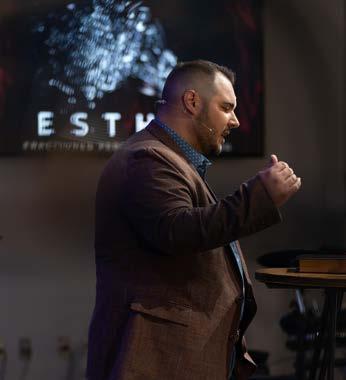
In 2021, God again surprised Coleman when Traffanstedt resigned to plant an urban church in Houston. “We had never planned to be in west Texas longer than two years,” Coleman says, “but after prayer, we felt God had called us here.” In May 2021, Cole man began preaching weekly and in October, the church extended the call as pastor and voted unanimously for him to serve in that capacity.
Traffanstedt says he simply put into Coleman what he had received from his former pastor, his experiences, and “what I learned from Chris Shirley’s class at Southwestern.”
Shirley (’94, ’02), dean of the Jack D. Terry School of Educational Ministries, professor of educational ministries, and Jack D. and Barbara Terry Chair of Religious Education, said that mentorship through relationships is something he aims for in all of his classes, which filtered through Traffanstedt and ultimately to Coleman.
“I try to be open and engaging with all of my students, regard less if online or on campus. I am a mentor to every student,” Shirley says, adding that his philosophy on teaching is built on relation ships, encouraging the student to visit with him in class, outside of class or even beyond the student’s time at seminary, when “the learning really starts.”
“I say, ‘When you are on the field, then you need an advocate, and please know that I’m a teacher not just for these weeks we are together, but I’m your teacher from now on,’” Shirley says, adding, “A phrase I use regularly is ‘I want to add value to your ministry. I give you permission to bother me.’”
Using examples like Elijah and Elisha or Paul and Timothy, Shir ley says, “In my Strategies for Disciple-Making course, we talk about the importance of personal relationships in discipleship. That leads us to a discussion on one-on-one, which is mentoring; I give them the break down on how to do mentoring effectively.”
Over the years, God used several men who poured into Coleman: his father; his grandfather, who was also a pastor and Southwest ern graduate; Blain Craig (’01, ’11), his senior pastor at Oak Crest Baptist Church; and seminary professors, like David Mills (’91), a former Southwestern evangelism professor who taught him how to do door-to-door evangelism, make hospital visits, and spent a weekend walking alongside him in ministry.
“God has always put in my path the blessing of men who have been there before in ministry,” Coleman says. “That’s what I loved about Southwestern. I always tried to take courses with professors who were retired pastors or had been in ministry for a long time.”
While at Southwestern, Coleman saw the relationships that

“But when God calls, our risks for obedience are always opportunities for us to grow in our trust and our becoming more like Jesus.”
professors built with students outside of the classroom, such as Richard Ross (’74, ’80), senior professor of student ministry. “I witnessed Dr. Ross eating lunch with and grabbing coffee with students, with the next generation, and discipling them,” Coleman recalls. “I’ve heard it said that some of the best lessons are caught and watching Dr. Ross interact with students and encourage them to pour into the next generation is one of the best displays of gen erational discipleship I witnessed.”
Louis Alvarado came to faith since Coleman has been at Mis sion Dorado and has been called to the ministry. “Mentorship to me is being able to understand God’s Word and study alongside fellow believers who understand me,” Alvarado says, adding that it’s not just Tuesday mornings but having Coleman share with him oppor tunities in ministry. “It’s sharing my struggle in everyday life and to be able to sit in a room with Jonathan and expand our knowledge of God’s character and grace,” Alvarado explains.
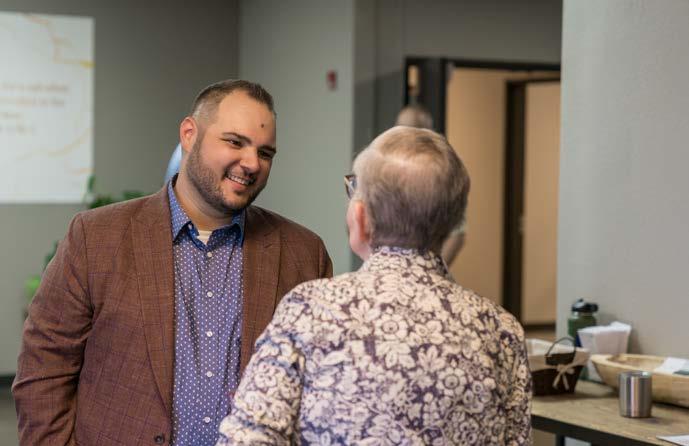



He admits mentorship is time-consuming, messy, and often difficult, but he draws upon his years in music as an illustration. In music, Coleman says, “excellence is always at the forefront, but nothing is going to be as excellent as you want. Dr. Borror told us, ‘It’s not about the performance, it’s about the journey in getting there.’”
Coleman says being perfect is not who he is, but he can love others well. “Every Sunday before I preach, I pray, ‘God, I have noth ing worth saying, but Your Word has everything worth hearing.’ God doesn’t need you to do great things. He just needs you to be faithful in small things.”
The public gospel invitation has been criticized by preachers on opposing sides of the philosophical and theological spectrums. Some well-meaning discipleship experts are convinced that dis ciples can be made only over a prolonged period of time in the context of a relationship. Although a growing number of pastors and preachers have abandoned the use of public invitations in their sermons, the need to call men, women, boys, and girls pub licly to profess their faith in Jesus Christ has never been more urgent.
The Gospels describe Jesus’ ministry primarily as one of instantaneous disciple-making through preaching. This obser vation, however, does not mean that He neglected the practice of personal disciple-making. Two early incidents of His pub licly making disciples occurred when He appealed that (1) the crowds should repent and believe the gospel (Matt 4:17; Mark 1:14-15) and (2) select Galilean fishermen should follow Him
Matthew 28:19-20
“Go therefore and make disciples of all nations, baptizing them in the name of the Father and of the Son and of the Holy Spirit, teaching them to observe all that I have commanded you.”
and become fishers of people (Matt 4:19; Mark 1:17; cf. Luke 5:20). The context of these occasions indicate that His hear ers responded publicly and immediately to His call. Early in his Gospel, John describes the ministerial activity of Jesus and His followers as “making and baptizing . . . disciples” (John 4:1-2; cf. 3:22). The large numbers of disciples that Jesus made and who His few followers, in turn, baptized implies they occurred as a result of public preaching, not one-on-one conversations (although He practiced conversational disciple-making through out the Fourth Gospel, e.g., John 1:40-51; 3:1-10; 4:7-26; [7:5311]; 9:35-41).
Not only did Jesus make disciples through preaching, but He commissioned His disciples to do likewise. Matthew 10, Mark 6, Luke 9, and Luke 10 all recount Jesus’ sending follow ers to preach with the intent that those who would hear their message would also immediately respond—positively or neg atively. He anticipated that not everyone would repent and believe their message.
For this reason, Jesus instructed His followers to shake the dust off their feet whenever anyone would reject their mes sage upon hearing it (Matt 10:14; Mark 6:11; Luke 9:5). Shaking the dust off one’s feet was a gesture pronouncing indictment against a preacher’s hearers for rejecting his message about the kingdom of God. The New Testament documents only two occurrences of this practice, and in both cases it took place in the context of Paul’s making disciples through preaching. In Acts 13:51, Paul and Barnabas “. . . shook off the dust from their feet against . . .” the Jews, who incited and instigated per secution against them for boldly speaking the gospel. In Acts 18:6, Paul shook his garments, resembling Nehemiah’s dra matic warning to those Jewish nobles and officials who were unjustly exacting interest from their countrymen (Neh 5:13). By emulating Nehemiah in this manner, Paul indicted the Jews in the synagogue who had rejected his preaching of Jesus as the Messiah.
Before He ascended back into heaven, Jesus commanded His disciples, “Go therefore and make disciples of all nations, baptizing them in the name of the Father and of the Son and of the Holy Spirit, teaching them to observe all that I have com manded you” (Matt 28:19-20a, emphasis added). These dis ciples, eleven of whom would serve as His apostles, went to Jerusalem to wait for the Holy Spirit. Upon receiving the Spirit, they publicly began supernaturally speaking in the tongues of the Jewish pilgrims from all over the then-known world. Peter stood with the rest of the apostles and preached from Joel and the Psalms. As a result of the Spirit’s work in, through, and around them, Peter and the disciples made three thousand dis ciples, whom they immediately baptized and then taught obedi ence to Christ’s commands (Acts 2:41-47).
Not every public attempt to make disciples in Acts was met with such a reception. Stephen, the first Christian martyr, preached with the intent that those who were listening to him while also being convicted by the Spirit (cf. Acts 7:51, 54) would immediately and publicly turn and follow Christ. Unlike the response that Peter received, those to whom Stephen spoke
rigidly rejected his word. In fact, Stephen indicated that their instant rejection of him, his message about Christ, and the Spir it’s conviction constituted sin. He cried out, “Lord, do not hold this sin against them” (Acts 7:60).
Other early disciples also put into practice Jesus’ command to make disciples as their responsibility. For example, Luke recorded Philip’s making disciples and baptizing them (Acts 8:440), some men from Cyprus and Cyrene who preached Christ and witnessed multitudes’ turning to the Lord (Acts 11:20-26), and Paul (Acts 13:14-52; 14:1; 14:20b-21; 16:12-15, 22-34; 17:14, 10-12, 16-34; 18:4-8, 19:1-7, 21-26; 28:16-24). Each of these occasions occurred when they preached the gospel in public settings. In fact, the predominate method by which most Chris tian disciples were both made and baptized in the New Testa ment took place when preachers issued public appeals for their hearers to repent and believe immediately.
The majority of these instances in Acts are attributed to Paul. Luke described this form of disciple-making as persuasion (Acts 17:4; 18:4; 19:26; 26:27-29; 28:23; cf. 2 Cor 5:11, which evidences Paul’s corroboration). His method and practice of persuasion, however, was not conducted through manipulative means. Instead, it was empowered by and in concert with the convincing and convicting work of the Holy Spirit.
The public precedent to make disciples still applies to preachers today. Although disciple-making methods vary from Christian to Christian, preaching is the primary way that every pastor should attempt to make disciples. Examples and prece dents for doing so are replete throughout the Gospels and Acts. In order to make disciples through public proclamation, those who preach must urgently appeal for hearers to repent and believe. Otherwise, how else will unbelievers who are convicted by the Holy Spirit upon hearing the Word know how to respond in order to become baptized, obedient disciples? Making disci ples through preaching does not mean, as some may suppose, that those who do so compete with God for credit concerning the results of their actions. Instead, publicly making disciples means their actions are in complete compliance with His authoritative directive to make, by the power of His Holy Spirit, disciples of all peoples.
Taken from The Gospel Invitation: Why Publicly Inviting People to Receive Christ Still Matters. Copyright ©2023 by Thomas Nelson. Used by Permission of Thomas Nelson.
O.S. Hawkins (’74, ’20) is senior advisor and ambassador-at-large at Southwestern Seminary.
Matt Queen is interim provost and vice president for academic administration, the L.R. Scarborough Chair of Evangelism (“Chair of Fire”), and associate dean of the Roy J. Fish School of Evangelism and Missions.
Seminary Hill Press’s latest release recalls the history of revivals
Published by Seminary Hill Press, When the Fires of Heaven Fell by Malcolm McDow (’62) is an updated and revised edition of McDow’s previously published history of God’s work of shaping history through revivals and is scheduled for release in early 2023. Recounting the history of reviv als from Mount Sinai to the present day, the author shows the role of prayer and the posture of humility and longing for God’s move ment in the hearts and lives of those God used in revival. McDow, retired professor of evangelism, shares his own personal experience of revival while encouraging the reader to ask the questions, “How has God moved in the past, and what can we learn from the ways He has moved previously to prepare us for His fresh wind to blow in our time?”
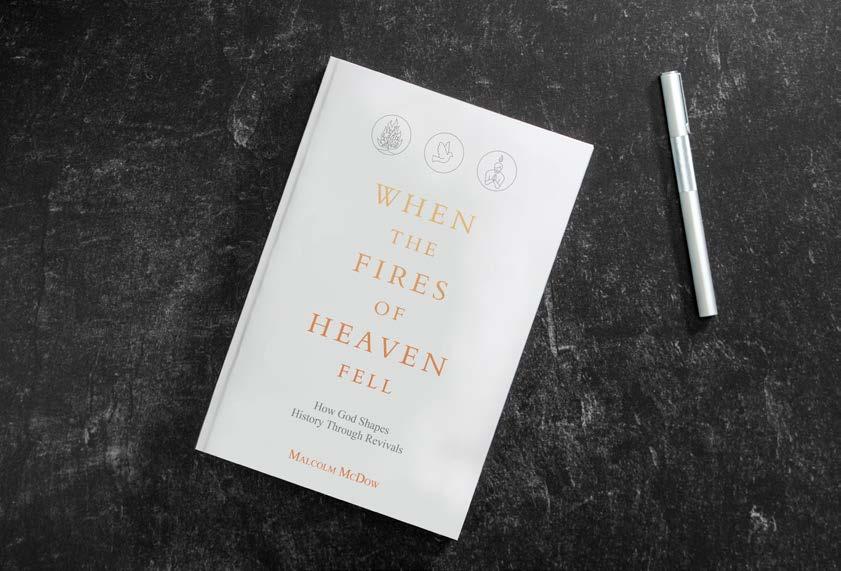

B&H Academic (2023)
MATT QUEEN
Queen examines the Bible’s teachings on evangelism, including a biblical basis for evangelism, methods and strat egies for sharing the Gospel, and reasons why believers should be motivated to share the Good News with lost people. The book was written for sem inary students, church leaders, and Christians who want to learn more about evangelism and how to engage others with the Gospel.

Lexham Academic (2022) COLEMAN M. FORD
Ford examines Augustine’s theology of friendship in A Bond between Souls: Friendship in the Letters of Augustine. Ford explains the third-century theologian saw that through Christ Jesus, friendship with God is restored. In examining Augustine’s view of friend ship, Ford shows that though friendship changes based on the context, it is an “overflow of love” and necessary to grow in Christlikeness.
AVANT ( ’86, ’ 90), PRESIDENT, LIFE ACTION
COLLECTIVETHE FULLNESS OF TIME: PAUL’ S EPISTLE TO THE

H&E Publishing (2022)
J. STEPHEN YUILLE
In The Fullness of Time, Yuille outlines Paul’s defense to the Church at Galatia that Christ alone is sufficient for salvation. Noting Christ does all the work of salvation, Yuille reminds the reader through the book of Gala tians that Christ has satisfied God’s wrath through His death on the cross.
As
Juan R. Sánchez associate professor of theology
“Deacons are simply servants set apart by the church. They’re official servants of the church. Everyone serves, but deacons are set apart servants, recognized by the church for specific tasks. Then pastors are those who are responsible for the feeding, protecting, and praying over the congregation.” (on sbclife.net)
A college football coach takes a stand for life
Daniel M. Darling director of the Land Center for Cultural Engagement
“What is refreshing about Harbaugh’s public advocacy for the unborn is just how public it is. Few in his position are willing to risk reputational damage by standing up for life.” (on wng.org)
Scripture engagement, in-person church key to solving evangelicals’ belief crisis, experts say
dean of the School of Theology
“We who are called by the churches, as pastors, teachers, and elders, must redouble our prayers, our labors, and our love among the saints, in order to teach the Word of God and in order to by God’s mercy, deepen our faith in everything that God has spoken. Every sin begins with a distrust of … God’s Word, either in the truth of God’s Word or in the practical benefits of that truth.” (on washingtontimes.org)
“When the Fires of Heaven Fell is one of the most important books you will ever read because it is about the most important thing we need — a fresh movement of God among us! Learn from God’s work in the past to prepare for God’s work in the present!”
—JOHN
ALBERT L. REYES (‘89, ‘95), PRESIDENT AND CEO OF BUCKNER INTERNATIONAL, was named the 2022 recipient of the D Magazine award for leadership excellence in the category of mega nonprofit at the 2022 Nonprofit and Corporate Citizenship Awards Ceremony. The award is presented to the leader of an “exceptional nonprofit organization CEO, executive director, or board chair.” Reyes has served with the organization since 2007, first serving as the president of Children and Family Services and assuming the role of president and CEO in 2012. Prior to serving with Buckner, Reyes served as the president of the Bap tist University of the Americas (BUA) in San Antonio, Texas, and pastored three churches.—A. A.
MATT CARTER (’06) WAS NAMED THE VICE PRESIDENT OF MOBILIZATION of the North American Mission Board’s Send Network in September. The announcement came following Carter’s retirement as senior pastor of Sagemont Church in Houston, where he has served since March 2020. Prior to serving the Houston church, the Texas native served as the senior pastor of The Austin Stone Church in Austin, Texas. Carter planted the church in Austin in 2002 and led the church for 18 years.—A. A.
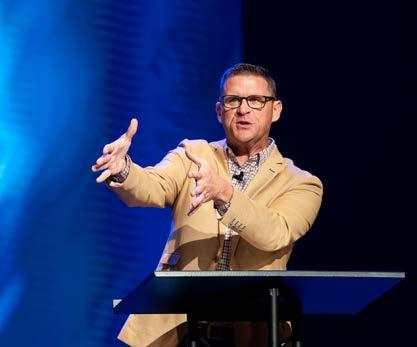
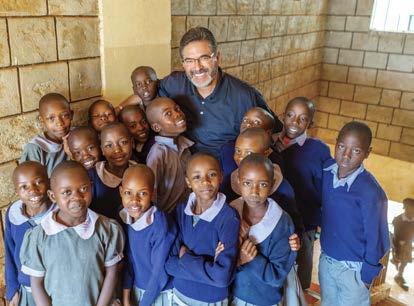
GENERAL CONVENTION OF TEXAS who helped establish the Singing Men of Texas, the Texas Baptist All-State Youth Choir, the Texas Baptist All-State Youth Band, and Texas Baptist All-State Strings, died August 11 at 92 years old. The Texas native earned his Bachelor of Sacred Music from Southwestern Seminary in 1952 before serving as a music minister in churches across the state. He joined the BGCT staff in 1961 as the associate director of the church music department, a role he held for ten years before assuming the director position.—A. A.
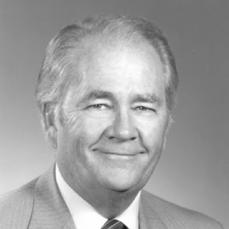
1980
Charles Edward Williams (MACM 1984) to Taylor Road Baptist Church in Montgomery, AL as senior adults minister.
1990
Samuel Brian Crosby (MDIVBL 1993) to Trinity Baptist Church in Gatesville, TX as pastor.
David C. Ummel (MARE 1993) to Buckner Westminster Place in Longview, TX as executive director.
Dale Ray Prudhome (MM 1996) to First Baptist Church in Nederland, TX as worship pastor.
Gregory Dean Luttrell (MDIV 1998) to Insight for Living Ministries in Frisco, TX as pastor/biblical counseling.
2000
William Matthew McClure (MDIVBL 2005) to First Woodway Baptist Church in Woodway, TX as Youth Pastor.
Robert J. Matz (MDIV 2009) to Hannibal-LaGrange University in Hannibal, MO as President
2010
Paul Michael Fisher (MACE 2014) to First Baptist Church in Farwell, TX as Pastor.
George Kenneth Day (MTS 2017) to Rogers State University in Claremore, OK as Director of Communications and Marketing.
Gwendolyn Irene Jenkins (MARE 1988) retired, living in Southaven, MS.
1940
Virginia Lucille Highfill King (DipRE 1949)
1950
Jeanne Seaborn Samuel W. Prestidge, Jr. (BSM 1952)
John Herschel Faulkner (BDIV 1966; DMIN 1983)
Paul Beasley Faulkner (MARE 1966; EdD 1968)
John Dale Lewis (MDIV 1969) 1970
Glen Edward Latimer (DipTH 1974) 1980
Kenneth Ausborn Goode, Jr. (MACSS 1987)
Jane Brock Weatherly (MARE 1987)
1970
Mark David McClard (MDIV 1971) retired with wife, Evelyn, living in Crestview, FL.
John Wayne Granger (MDIV 1975) retired with wife, Kathy, living in Enterprise, AL.
1980
Terry Lee Townsend (MARE 1987) retired with wife, Diana, living in Jena, LA.
Marjorie Eunice Smith Elliott (MARE 1954)
Paul Orbie Cheek (BDIV 1956)
James Fritz Kirstein (BDIV 1956)
James Valton Lobaugh (BDIV 1957)
1960
Robert Duaine Burgin
Billy Joe Reed (MRE 1961)
Robert Glynn Russell (MRE 1962)
Don Roell Cooper, Sr. (BDIV 1965)
Tina Marie Sagisi (MARE 1988) 1990
James Edward Thomson (ThM 1992)
Timothy Dawson Brown (MDIV 1993)
Bruce Edward Welch (MARE 1996)
David Nat Guel (MARE 1998; DEDMIN 2003)
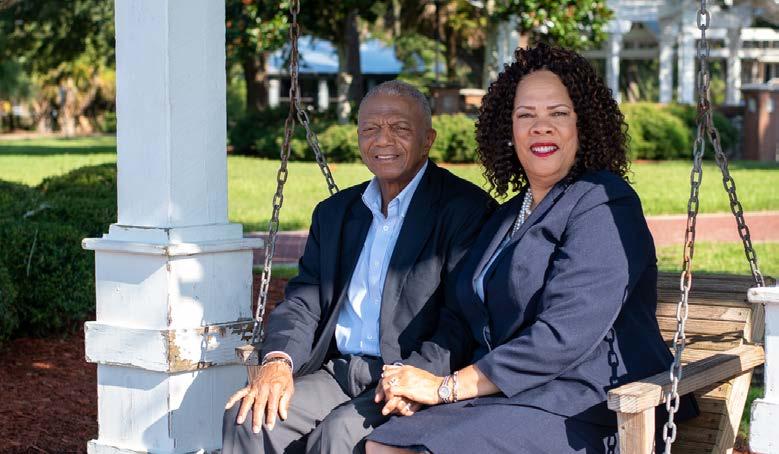 BY ASHLEY ALLEN
BY ASHLEY ALLEN
ACHOKED-UP RETIRED CMDR. AARON JEFFERSON (’82, ’88) EXPLAINS that during his last year as a Southwestern Semi nary student people who “invested” in him are still a “blessing” today.
Aaron and his wife, Clainetta, were a young couple with three children living and serving in the Houston-area. Aaron was serving as a chaplain and taking classes at the Southwest ern campus that was then located at Houston Baptist University. He mentioned to a fellow chaplain money was “kind of short” and he was not certain how he was going to pay for classes for the upcoming fall semester. His chaplain friend told him if he was not able to
pay for his classes when August arrived to call him. Aaron called. The friend met with the deacons at his church and called Aaron to tell him the church would cover his tuition, fees, and books for the upcoming semester.
“That was just a blessing,” he recalls. The church was “people investing in me that did not know me. …No strings attached. No con ditions,” he says, noting the attitude of the church members was, “We want to help this young seminarian finish seminary.”
The event is one that has remained with Aaron and Clainetta and spurred their desire to “invest back” into other Southwestern Sem inary students “as an encouragement to them” so they can know their expenses are paid for
and they “can continue their studies,” Aaron says.
In December of 2021, the couple estab lished the Aaron and Clainetta Jefferson Endowed Scholarship to help African Amer ican students who are called to military chaplaincy or international missions. Aaron served for 22 years as a military chaplain and Clainetta continues to minister as a school liaison officer, or educational consultant, to military families.
The couple first met after a mutual friend set them up on a blind date. Aaron, a Hous ton-native, was serving as an assistant pastor at a church and attending Southwestern. Clainetta, a native of Tallahassee, Florida, relo cated to Houston to work as an accountant at
an associate pastor, enlisted in the United States Navy and became a chaplain in the Navy after he met a naval chaplain recruiter. The opportunity to serve was one Aaron says he “enjoyed immensely” as he and his family were able to minister to other Navy families in Okinawa, Japan, Bahrain, and several other countries. Upon Aaron’s retirement from the Navy chaplaincy, the couple settled in King’s Bay, Georgia, near the shared border with Flor ida, to be closer to their children, the oldest of whom serves in the Navy.
Clainetta, who holds a master’s degree in education, explains as Aaron was finishing his seminary studies and they were raising their three children, they “could not” have com pleted their time on Seminary Hill “without the
an accounting firm following graduation from Florida A&M University. After coordinating their two schedules that were filled with min istry activities at their respective churches, the two were finally able to meet at 2 p.m. for dinner on a Sunday afternoon. Almost 40 years later, the couple has enjoyed a lifetime of ministry serving military families around the world.
Aaron, who holds an undergraduate degree from Houston Baptist University, explains he chose to attend Southwestern Seminary because among Houston Baptist students, “It was always Southwestern. None of the other seminaries ever came up.” Aaron, who holds a Master of Arts in Religious Edu cation and a Master of Divinity from the Fort Worth institution, says the popularity, confi dence, and experiences other students had and talked about encouraged him to attend the school. Aaron says his brother, Keith Jef ferson, a 1980 Master of Divinity graduate, was also influential in encouraging him to attend Southwestern.
While at Southwestern, Aaron says pro fessors including the late Roy J. Fish, William B. Tolar, L. Russ Bush, and Virtus Gideon, made his seminary studies “pleasant” as they “invested” and “poured into” him.
Following seminary graduation, Aaron, who had been serving on a church staff as

selfless generosity of people,” some of whom they knew, but who “more often than not” were people the couple did not know. The kindness they experienced inspires the Jeffersons to do the same for today’s seminary students.
“We all have heard the stories of how God has opened doors and poured out blessings and we just want to be a vessel that our Lord could use to bless someone else,” Clainetta says. She adds the words of the song, “May Those Who Come Behind Us Find Us Faith ful,” remind her that “whatever we do, do it in such a way that we’ve laid a foundation that somebody could come behind us and stand soundly on that work, and build on it so that long after we’re gone, somebody will be able to keep the Gospel going forward in a way that lifts Christ up.”
Clainetta says she views the scholarship as the couple’s “first seed” but not their last. “It’s about making the investment in some other young couple,” she says. “We are empty nesters now. Our children are grown and gone and so we think about those young families who still have babies in diapers and may be just trying to get their start in the work of min istry that they believe God has called them to and if we could, in some small way, invest in them and the work that God’s calling them to, then we would be overjoyed.”
“We all have heard the stories of how God has opened doors and poured out blessings and we just want to be a vessel that our Lord could use to bless someone else,”
– CLAINETTA JEFFERSON
It is a distinct honor to be given the oppor tunity to help lead Southwestern Seminary during this time of transition with David S. Dockery, our interim president. There is not a finer statesman in Christian higher education than Dr. Dockery. He is leading well at this strategic time in the history of our seminary. Together, we are committed to doing all that we can to restore confidence and to advance the mission of our seminary in keeping with the vision of our great founder, B.H. Carroll.
We offer our deepest thanks to all who are rallying to our call for support both in prayer and giving to Southwestern. Large gifts from the Southern Baptists of Texas Convention, Prestonwood Baptist Church, and Second Baptist Church Houston were wonderful blessings just days after the announcement of the new interim leadership. Since then, we are delighted to report sacrificial gifts from First Baptist Church of Wichita Falls, Texas, the Nevada Baptist Convention, First Baptist Church of Dallas, and North Richland Hills Baptist Church in North Richland Hills, Texas. These gifts and others are greatly appreci ated, especially as we enter the end of the year when gifts are especially meaningful to the seminary.
The prophet Nehemiah’s approach to rebuilding the walls in Jerusalem (Neh. 2:17-18) is our pattern as we seek to restore the confidence of all Southern Baptists in our seminary. Like Nehemiah, we have a four-pronged strategy.
First, we must face up. Nehemiah reviewed the ruins and evaluated the situation regarding the broken walls and burned gates. Dr. Dockery and I have been doing a deep dive into how and why the seminary finds itself in its present condition, evaluating all matters— internal budget controls, expense spending, enrollment, and other pertinent issues. We are facing the situation head on and making hard decisions.
Second, we must team up. Like Nehemiah and his troops, we are teaming up with our trustees to put best business practices in place as we initiate new measures to aggres sively manage our costs and add new policies that will hold us accountable for every cent given by the good people of the churches of the Southern Baptist Convention. A part of this effort will include making sure trustees are engaged with staff in our annual budget planning as well its execution throughout the year. Southwestern Seminary has a great team, both with our faculty and our staff, but also among the thousands of Southwestern
alumni and other friends. We welcome all players who love our seminary—come join our team and get in the game.
Third, we must gird up. Nehemiah pro jected a vision for the work that must be done. We pledge that we are going to work hard to earn the trust of all our SBC churches going forward and give a proper accounting of Cooperative Program dollars entrusted to us. Southwestern Seminary serves the churches of the Southern Baptist Convention; it is for those churches that our trustees govern this institution on their behalf. And it is to South ern Baptists at large that we make our appeal to join us in rebuilding our great seminary.
Finally, we must look up. Nehemiah con vinced his people that the hand of God was upon them. People have a way of rallying around something when they see God is in it. I’m confident that God’s hand is still on our seminary, just as it was when God gave His vision for this school to B.H. Carroll, our great founder. In 1908, Carroll founded South western Baptist Theological Seminary with a singular mission: to see a fresh movement of the Holy Spirit across Texas, our nation, and the world, bringing the Gospel to all who have not heard, from today until Christ comes. With the Bible at its foundation, Carroll cast a bold vision for training God-called men and women for ministry through classroom learning and hands-on ministry experience. We look up to God today and see that God is still with us. Not for our sake, but for His glory.
Our rebuilding effort needs the financial support of all Southwesterners and others who love our seminary. Your year-end gift to Southwestern Seminary is an investment in the next generation of pastors, missionaries, and Christian leaders who will take the Gospel to the ends of the earth. Your gift helps us teach with biblical and theological fidelity and academic excellence, to provide affordable and accessible education, and to offer stateof-the-art facilities.
I am fully confident that one day, with the help of all Southern Baptists, we will see a great rebuilding of Southwestern Seminary like Nehemiah saw the rebuilt walls of Jeru salem. Southwestern Seminary has a cher ished past and our job is to secure it, with God’s help, for future generations in fulfilling the original vision of B.H. Carroll. We will not waver from that vision.
O.S. Hawkins is senior advisor and ambassador-at-large of Southwestern Seminary.
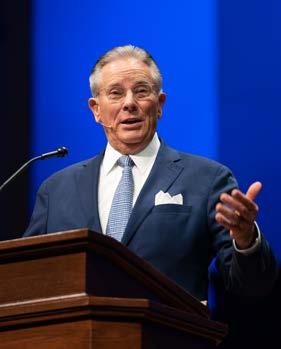
“Southwestern Seminary has a cherished past and our job is to secure it, with God’s help, for future generations in fulfilling the original vision of B.H. Carroll.”
